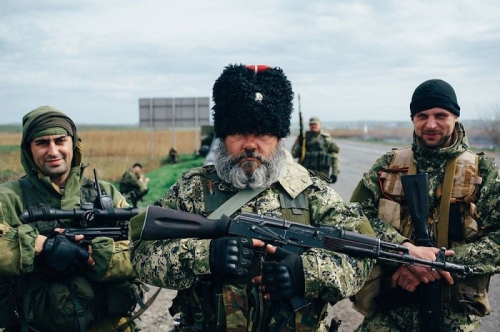Por Stephen Sizer*
Ex: http://www.elespiadigital.com
El sionismo cristiano es una teología que apoya un régimen político basado en el apartheid y la discriminación – sin embargo, millones de personas en los EE.UU. expresan su apoyo al mismo. ¿Cuán peligroso es, dado el papel de EE.UU. en el Medio Oriente?
1. Introducción
“Sólo una nación, Israel, se encuentra entre… la agresión terrorista y la disminución total de los Estados Unidos como potencia mundial democrática … Si Israel cae, los Estados Unidos ya no pueden seguir siendo una democracia. … El dinero árabe se utiliza para el control y la influencia de las principales corporaciones de EE.UU., por lo que es económicamente más y más difícil para los Estados Unidos hacer algo en contra del terrorismo mundial “. [1]
Mientras que muchos de ellos no necesariamente van tan lejos como Mike Evans, sin embargo es asumido por una gran parte de los cristianos en Gran Bretaña y Estados Unidos que es su responsabilidad bíblica apoyar al Estado de Israel y que la bendición de Dios sobre ellos está condicionada a la bendición de Israel. Dale Crowley, en una emisora religiosa de Washington, describe este movimiento como el “de más rápido crecimiento en Estados Unidos“:
“No esta compuesto de locos” sino por estadounidenses de clase media-alta. Que dan millones de dólares cada semana a los evangelistas de la televisión que exponen los fundamentos de la secta. Ellos leen a Hal Lindsey y Tim LaHaye, quienes difunden un objetivo:. “Ayudar a la mano de Dios para flotar hasta el cielo libre de todos los problemas, desde donde verán el Armagedón y la destrucción del planeta Tierra” [2]
Definición del sionismo cristiano
El sionismo cristiano es esencialmente el apoyo cristiano al sionismo. El sionismo es un sistema político basado en la exclusividad étnica judía dándoles derechos políticos preferenciales que se les niegan a los palestinos. Las Naciones Unidas han definido al sionismo como una forma de racismo y de apartheid. Sin embargo, en palabras de Grace Halsell el mensaje esencial de los sionistas cristianos es el siguiente: “todo acto adoptado por Israel está orquestado por Dios y debe ser tolerado, apoyado, e incluso ensalzado por el resto de nosotros“. [3]
La importancia del movimiento cristiano sionista
Las estimaciones sobre el tamaño del movimiento en su conjunto varían considerablemente. Mientras que críticos como Crowley afirman: “Por lo menos uno de cada 10 estadounidenses es un devoto ‘, es decir, entre ‘25 a 30 millones“, los sionistas cristianos por su parte, como Pat Robertson y Jerry Falwell, afirman tener acceso semanal a 100 millones de estadounidenses simpatizantes [4 ]. Cualquiera que sea la cifra real, todos están de acuerdo en que el número está creciendo en tamaño e influencia [5]. Ellos son guiados por 80.000 pastores fundamentalistas y sus puntos de vista difundidos por 1.000 emisoras locales de radio, así como 100 canales de televisión cristiana [6]. Doug Krieger dio una lista de más de 250 organizaciones pro-israelí fundadas solamente en la década de 1980 [7].
Por ejemplo, Unity Coalition for Israel, que es la más grande, reúne a 200 diferentes organizaciones sionistas judías y cristianas, incluyendo la International Christian Embassy, Christian Friends of Israel y Bridges for Peace . Ellos reclaman tener una base de apoyo de 40 millones de miembros activos [8]. Estas organizaciones conforman una amplia coalición que no sólo ayuda a mantener al gobierno racista de Sharon en el poder, sino también, como veremos más adelante, ayudan a dar forma a la postura agresiva de la política exterior de EE.UU. en el Medio Oriente.
El aumento del sionismo cristiano contemporáneo se remonta a la fundación del Estado de Israel en 1948, que llegó a ser vista como la realización más importante de la profecías bíblicas [9], de hecho, para muchos, “la mayor noticia profética que hemos tenido en el siglo XX ” [10]. Después de la Guerra de los Seis Días en 1967, Billy Graham, suegro de Nelson Bell, editor de Christianity Today, expresó los sentimientos de muchos evangélicos estadounidenses, cuando en una editorial de la revista, escribió: “por primera vez en más de 2.000 años Jerusalén está completamente en manos de los Judíos, lo que produce a un estudiante de la Biblia una emoción y una renovada fe en la exactitud y validez de la Biblia” [11].
 En 1976, una serie de acontecimientos llevaron al sionismo cristiano a la vanguardia de la política dominante de EE.UU.. Jimmy Carter fue elegido como el “renacido” presidente que marcaría el apoyo de la derecha evangélica. En Israel, Menachem Begin y el ala derecha del partido Likud llegaron al poder al año siguiente. Una coalición tripartita emergió lentamente entre la derecha política, los evangélicos y el lobby judío. En 1978, Jimmy Carter reconoció cómo sus propias creencias pro-sionistas habían influido en su política en Oriente Medio [12]. En un discurso, describió el estado de Israel como “un retorno al pasado, a la tierra bíblica de la cual los Judíos fueron expulsados tantos cientos de años atrás… El establecimiento de la nación de Israel es el cumplimiento de la profecía bíblica y la esencia misma de su cumplimiento ” [13]. Sin embargo, cuando Carter vaciló sobre el agresivo programa del Likud y propuso la creación de un estado palestino, se distanció de la coalición de judíos pro- israelí, lo que condujo a que los evangélicos cambiaran su apoyo a Ronald Reagan en las elecciones de 1980. La elección de Reagan como presidente dio un impulso considerable a la causa sionista cristiana. Don Wagner explica: “La elección de Ronald Reagan marcó el comienzo no sólo de una tendencia aun más pro-Israel en la historia de la administración, sino que además dio importantes puestos en el gobierno a varios prominentes cristianos sionistas. Además del Presidente, quiene se suscribe a una teología premilenarista futurista y al sionismo cristiano, podemos mencionar al Procurador General Ed Meese, al Secretario de Defensa Casper Weinberger, y al secretario del Interior James Watt” [14].
En 1976, una serie de acontecimientos llevaron al sionismo cristiano a la vanguardia de la política dominante de EE.UU.. Jimmy Carter fue elegido como el “renacido” presidente que marcaría el apoyo de la derecha evangélica. En Israel, Menachem Begin y el ala derecha del partido Likud llegaron al poder al año siguiente. Una coalición tripartita emergió lentamente entre la derecha política, los evangélicos y el lobby judío. En 1978, Jimmy Carter reconoció cómo sus propias creencias pro-sionistas habían influido en su política en Oriente Medio [12]. En un discurso, describió el estado de Israel como “un retorno al pasado, a la tierra bíblica de la cual los Judíos fueron expulsados tantos cientos de años atrás… El establecimiento de la nación de Israel es el cumplimiento de la profecía bíblica y la esencia misma de su cumplimiento ” [13]. Sin embargo, cuando Carter vaciló sobre el agresivo programa del Likud y propuso la creación de un estado palestino, se distanció de la coalición de judíos pro- israelí, lo que condujo a que los evangélicos cambiaran su apoyo a Ronald Reagan en las elecciones de 1980. La elección de Reagan como presidente dio un impulso considerable a la causa sionista cristiana. Don Wagner explica: “La elección de Ronald Reagan marcó el comienzo no sólo de una tendencia aun más pro-Israel en la historia de la administración, sino que además dio importantes puestos en el gobierno a varios prominentes cristianos sionistas. Además del Presidente, quiene se suscribe a una teología premilenarista futurista y al sionismo cristiano, podemos mencionar al Procurador General Ed Meese, al Secretario de Defensa Casper Weinberger, y al secretario del Interior James Watt” [14].
Los White House Seminars se convirtieron en una característica regular de la administración Reagan, por los cuales se trajeron a sionistas cristianos como Jerry Falwell, Mike Evans y Hal Lindsey para tener acceso directo y personal con los dirigentes nacionales y el Congreso. En 1982, por ejemplo, Reagan invitó a Falwell para dar un informe al Consejo de Seguridad Nacional sobre la posibilidad de una guerra nuclear con Rusia [15]. Hal Lindsey también afirma que Reagan lo invitó a hablar sobre el tema de la guerra con Rusia para los funcionarios del Pentágono [16]. En una conversación personal publicada por el Washington Post dos años después, en abril de 1984, Reagan elaboró sus propias convicciones personales con Tom Dine, uno de los principales lobbistas israelí que trabajó para la American Israel Public Affairs Committee (AIPAC): ‘Como saben, me dirijo de nuevo a los antiguos profetas en el Antiguo Testamento y a las señales anunciadas del Armagedón, y me pregunto si – si somos la generación que va a ver que esto se acerca. No sé si usted ha observado alguna de estas profecías últimamente, pero créanme, ciertamente describen los tiempos que estamos viviendo ” [17].
Mientras que George Bush padre, Bill Clinton y George W. Bush no parecen haber compartido los mismos presupuestos acerca de estos designios que Jimmy Carter y Ronald Reagan, sin embargo han mantenido, aunque sea a regañadientes, la fuerte posición pro-sionista de sus predecesores [ 18]. Esto se debe principalmente a la influencia del lobby sionista considerado por muchos como el más poderoso de los Estados Unidos [19]. Aluf Ben, un portavoz de Shimon Peres, fue citado por el diario de mayor circulación en Tel Aviv, Ha´aretz: “el 60 por ciento de toda la ayuda económica a los demócratas provenía de fuentes judías” [20]. Según el Informe de Washington Report on Middle East Affairs, “la mayoría de los recaudadores de fondos pro-Israel estiman que al menos del 60 al 90 por ciento de la campaña demócrata es financiada por fuentes judías, también suministran quizá el 40 por ciento del financiamiento republicano” [21]. Tal vez por eso es difícil encontrar a un solo político electo estadounidense dispuesto a criticar a Israel en público.
Tres líderes cristianos en particular, cada uno de ellos instalado en la Casa Blanca por Reagan, probablemente han logrado más que cualquier otro en los últimos treinta años en lo que respectaa a asegurar que la política exterior estadounidense sigue siendo pro-sionista. Son Jerry Falwell, Pat Robertson y Hal Lindsey, quienes se convirtieron en fervientes partidarios del Estado sionista. Grace Halsell describe la conversión de Falwell:
“La victoria israelí fue un hecho impresionante de gran impacto no sólo en Falwell, sino… para muchos de los estadounidenses. Recuerden que en el año 1967, los Estados Unidos estaban sumidos en la guerra de Vietnam. Muchos sintieron una sensación de derrota, impotencia y desánimo. Como estadounidenses, nos hicieron muy conscientes de nuestra disminuida autoridad, de no ser capaces de ser la policía del mundo o incluso de nuestros propios vecindarios… Muchos estadounidenses, incluyendo a Falwell, volvieron su mirada de adoración hacia Israel, viéndolo militarmente fuerte e invencible. Ellos dieron su aprobación sin límites a la toma de posesión de Israel de tierras árabes debido a que percibieron esta conquista como de poder y de justicia… Cristianos machos y musculosos como Falwell atribuyen al general israelí Moshe Dayan un “aura de héroe” por esta victoria sobre las fuerzas árabes y le llama el hombre de los milagros de la era, siendo invitado por el Pentágono a visitar Vietnam y decirnos cómo ganar esta guerra “. [22]
En 1979, el mismo año en el que Falwell fundó Moral Majority, el gobierno israelí le dio un avión Lear para que le ayudase en su defensa de Israel. Un año más tarde, en 1980, Falwell también se convirtió en el primer gentil en recibir la medalla Vladimir Ze’ev Jabotinsky por su excelencia sionista, de manos del Primer Ministro de Israel, Menachem Begin. Jabotinsky fue el fundador del sionismo revisionista y sostuvo que los judíos tenía un mandato divino para ocupar y colonizar “a ambos lados del río Jordán” y que no debían dar cuentas al derecho internacional [23]. Cuando Israel bombardeó la planta nuclear de Irak en 1981, llamaron por teléfono a Falwell antes de llamar a Reagan. Llamó a Falwell para preguntarle cómo “explicar al público cristiano las razones del atentado” [24]. Durante la invasión de Líbano en 1982, Falwell igualmente defendió las acciones de Israel:
“Cuando las masacres ocurrieron en los campos de refugiados palestinos, Falwell sólo imitó la línea israelí: “Los israelíes no están involucrados”. Y aun cuando el New York Times estaba dando testimonios de bengalas israelíes enviadas para ayudar a los falangistas a entrar en los campos, Falwell decía: “Eso es sólo propaganda”“ [25].
En marzo de 1985, Falwell habló ante la conservadora Asamblea Rabínica en Miami y se comprometió a “movilizar a 70 millones de cristianos conservadores por Israel” [26]. En enero de 1998, cuando el primer ministro israelí Benjamin Netanyahu visitó Washington, su primera reunión fue con Jerry Falwell y con The National Unity Coalition for Israel, en una gran reunión de más de 500 líderes cristianos fundamentalistas, en vez de con el presidente Clinton. De acuerdo con Donald Wagner, la multitud aclamó a Netanyahu como “el Ronald Reagan de Israel.” Esta vez Falwell prometió ponerse en contacto con 200.000 pastores y líderes de iglesias que reciben su National Liberty Journal [27], y pedirles que “digan al presidente Clinton que se abstengan de presionar a Israel para cumplir con los acuerdos de Oslo” [28]. En una entrevista con The Washington Post en 1999, Falwell describe a la ribera occidental [Cisjordania] como “una parte integral de Israel“. Ante la idea de presionar a Israel a retirarse, añadió, “sería como pedirle a Estados Unidos dejarle Texas a México, para lograr una buena relación. Es ridículo” [29]. En el 2000, Falwell reanima Moral Majority bajo el nombre de People of Faith 2000, “como un movimiento para recuperar América como una nación bajo Dios“, el cual también tiene una fuerte posición pro-israelí [30]. Falwell ha tenido éxito, probablemente mejor que cualquier otro líder cristiano estadounidense, en convencer a sus seguidores a reconocer que su deber cristiano consiste en proporcionar un apoyo incondicional al Estado de Israel.
Mientras que Jerry Falwell podría ser uno de los cristianos sionistas más influyentes, también es un mascarón de proa, junto con Pat Robertson, de una alianza mucho más amplia de más de 150 influyentes líderes fundamentalistas cristianos, que incluyen a Oral Roberts, Mike Evans, Tim LaHaye, Kenneth Copeland, Paul Crouch, Ed McAteer, Jim Bakker, Franklin Graham, James Dobson, Chuck Missler y Jimmy Swaggart, que han adoptado una postura pro-sionista en sus escritos o emisiones [31]. Estos líderes cristianos y sus organizaciones tienen acceso regular a más de 100 millones de cristianos, más de 100.000 pastores y a unos presupuestos conjuntos que alcanan cifras por encima de los 300 millones de dólares anuales. Ellos forman una coalición amplia e inmensamente poderosa que influye en la formación y la conducción de la política exterior de EE.UU. en el Oriente Medio, así como en el apoyo cristiano a Israel hoy en día.
El desarrollo histórico del sionismo cristiano
Si se desea explorar con más detalle las raíces históricas o la base teológica del movimiento, se debe echar un vistazo a la librerías, en las cuales hay algunos recursos útiles.
En su lugar, voy a centrarme ahora en seis aspectos de la agenda política del movimiento cristiano sionista, y a demostrar por qué los cristianos sionistas se oponen implacablemente al proceso de paz en Oriente Medio. De hecho quiero mostrar cómo pueden estar contribuyendo al holocausto que ellos predicen en el Medio Oriente .
La agenda política del sionismo cristiano
Vamos a examinar las seis formas en que la teología cristiana sionista ha sido traducida en acción política: Este esquema ilustra la correlación entre los movimientos de las doctrinas características y su agenda política.
Vamos a considerar cada uno de ellos:
1. El pueblo elegido: Apoyar el colonialismo israelí
La convicción de que el pueblo judío permanecerá como el “pueblo elegido” de Dios de alguna manera separado de la Iglesia, está profundamente arraigado en el sionismo cristiano. Una encuesta reciente de la revista Christianity Today sobre la opinión evangélica sobre Israel da una indicación de la fuerza del sionismo cristiano en Estados Unidos. La encuesta reveló que el 24% cree que “el mandato bíblico para los cristianos es apoyar el Estado de Israel” [32]. Esto se expresa en una variedad de maneras:
1.1 En pie con Israel
Después de la Guerra de los Seis Días en 1967, además del apoyo brindado por el gobierno de Estados Unidos, Israel ha estado en gran parte aislado de la comunidad internacional. Hal Lindsey se lamenta: “Hasta el momento de la Conferencia de Madrid de 1991, a los árabes se les llamaba “a” cumplir “,” desistir “,” abstenerse “, etc cuatro veces; en cambio a Israel se le “exigía”, “ordenaba”, etc, a cumplir la voluntad de la Asamblea General en trescientas cinco oportunidades. La ONU votó seiscientas cinco resoluciones entre su creación y la Guerra del Golfo. Cuatrocientas veinte y nueve de esas resoluciones, o el sesenta y dos por ciento del total de las resoluciones de la ONU fueron contra Israel o contra sus intereses ” [33].
Citando a Isaías 40, los cristianos sionistas consideran que su papel es “aliviar a Israel.” Así, por ejemplo, en octubre de 2000, pocos días después de la visita de Ariel Sharon al Haram Al-Sharif, que se programó deliberadamente para socavar al gobierno de Barak con miras a negociar con Arafat sobre una Jerusalén compartida [34], lo que provocó la segunda Intifada, se público un anuncio en el New York Times titulado “Open Letter to Evangelical Christians from Jews for Jesus.” En ella se hizo un llamamiento a los evangélicos para mostrar su solidaridad con el Estado de Israel en dicho momento crítico: “Ahora es el momento de apoyar a Israel. Queridos hermanos y hermanas en Cristo, nuestros corazones están tristes, mientras vemos las imágenes de violencia y derramamiento de sangre en el Medio Oriente … Amigos cristianos, “Los dones y el llamamiento de Dios son irrevocables” (Romanos 11:29). Por lo tanto nuestro apoyo a la supervivencia de Israel en esta hora oscura es irrevocable. Ahora es el momento para que los cristianos apoyen a Israel ” [35].
1.2 El lobby israelí en el Capitolio
Hasta la década de 1980, para EE.UU., Oriente Próximo fue en gran parte una instancia periférica de la amenaza global más amplia que planteaba el comunismo soviético. La protección de la Europa Occidental a través de la OTAN era una prioridad más importante. El colapso del comunismo, sin embargo, creó un vacío de poder en el Oriente Medio, que los EE.UU. han llenado. Después de la Guerra del Golfo para “liberar Kuwait” y luego, más recientemente, Afganistán de los talibanes y, a continuación, Irak del partido Baath de Saddam Hussein, los EE.UU. han aumentado considerablemente su influencia en el Medio Oriente. Muchos sostienen que la política exterior de EE.UU. se ha desviado por la influencia desproporcionada del lobby sionista. Michael Lind – analista político – resume la forma en que el lobby israelí ha distorsionado la política exterior de EE.UU.: “la ocupación israelí de Cisjordania y Gaza, habilitado por las armas y el dinero de EE.UU, inflama las actitudes anti-estadounidenses en los países árabes y musulmanes. La expansión de los asentamientos israelíes en territorio palestino es una burla del compromiso de EE.UU. a la autodeterminación de Kosovo, Timor Oriental y el Tíbet. Más allá de la región, la política de EE.UU. sobre la proliferación de armas nucleares es socavada por la doble moral que le ha llevado a ignorar el programa nuclear de Israel mientras condena los de India y Pakistán ” [36].
La derecha cristiana llegó a conformar la política exterior de EE.UU. en gran parte a través de la elección de Ronald Reagan en 1980. Su victoria sobre Jimmy Carter dio un impulso considerable a la causa sionista cristiana. Su elección, “marcó el comienzo no sólo de una tendencia más pro-Israel en la historia de la administración, otorgando varios importantes puestos políticos a sionistas cristianos. Los seminarios de la Casa Blanca se convirtieron en una característica regular de la administración Reagan, a través de la cual se instalaron líderes sionistas cristianos como Jerry Falwell, Mike Evans y Hal Lindsey, permitiéndoles contacto personal con los líderes nacionales y con el Congreso. En el mismo año, la International Christian Embassy of Jerusalem, fue fundada con el propósito de coordinar directamente las actividades del lobby político en cooperación con el gobierno de Israel” [37]. Junto con otras organizaciones que integran la Unity Coalition for Israel, tienen como principal estrategia presionar a los medios de EE.UU. y a la clase política, cuestionar lo que ellos llaman “la desinformación y la propaganda “, y expresar “la verdad acerca de Israel. “
 El poder del lobby pro-israelí asegura que Israel siga recibiendo entre 3 a 8 millones de dólares anuales de los EE.UU. en subvenciones, préstamos y subsidios, y ayuda militar. Este poder se puede medir por el hecho de que George Bush padre fue el último Presidente de los EE.UU. en criticar a Israel en público. Durante la Guerra del Golfo, causó disgusto en el lobby israelí que presionara a Israel para no tomar represalias contra los ataques de Irak, y prometió a los socios de la coalición árabe que él se ocuparía de la cuestión palestina. En septiembre de 1991, se quejó de que “hay 1.000 lobbystas en la colina del Congreso, presionando por las garantías de los préstamos para Israel, y soy un tipo un poco solitario aquí pidiendo al Congreso retrasar el examen de las garantías de préstamos por 120 días” [ 38]. Lind señala que el lobby pro-israelí también fue responsable de fomentar, “el mayor abuso del poder de indulto presidencial en la historia estadounidense“, cuando Bill Clinton, en su último día en el cargo, dio un polémico indulto a Mark Rich, el multimillonario fugitivo que en la lista del FBI figuraba como el “más buscado“. En un artículo del New York Times en febrero de 2001, Clinton explicó que lo había hecho por Israel:
El poder del lobby pro-israelí asegura que Israel siga recibiendo entre 3 a 8 millones de dólares anuales de los EE.UU. en subvenciones, préstamos y subsidios, y ayuda militar. Este poder se puede medir por el hecho de que George Bush padre fue el último Presidente de los EE.UU. en criticar a Israel en público. Durante la Guerra del Golfo, causó disgusto en el lobby israelí que presionara a Israel para no tomar represalias contra los ataques de Irak, y prometió a los socios de la coalición árabe que él se ocuparía de la cuestión palestina. En septiembre de 1991, se quejó de que “hay 1.000 lobbystas en la colina del Congreso, presionando por las garantías de los préstamos para Israel, y soy un tipo un poco solitario aquí pidiendo al Congreso retrasar el examen de las garantías de préstamos por 120 días” [ 38]. Lind señala que el lobby pro-israelí también fue responsable de fomentar, “el mayor abuso del poder de indulto presidencial en la historia estadounidense“, cuando Bill Clinton, en su último día en el cargo, dio un polémico indulto a Mark Rich, el multimillonario fugitivo que en la lista del FBI figuraba como el “más buscado“. En un artículo del New York Times en febrero de 2001, Clinton explicó que lo había hecho por Israel:
“Muchos antiguos y actuales funcionarios de alto rango de Israel de los dos principales partidos políticos y los líderes de las comunidades judías en América y Europa me pidieron el perdón del señor Rich por sus aportaciones y servicios a los israelíes a través de causas benéficas” [39].
El lobby pro-israelí es también acusado de participar en la selección, nombramiento y despido de funcionarios del gobierno de EE.UU. [40]. En 1980, el ex embajador de EE.UU. en Qatar, Andrew Killgore, escribió en el Informe a Washington sobre Asuntos del Medio Oriente, críticas sobre el lobby israelí: “Es erróneo y perverso por parte de elementos fanáticos dentro del dos y medio por ciento de nuestra población que son de origen judío, mantener como rehén al Congreso … Estados Unidos debe considerar la evolución y penetración de la influencia de Israel en la dirección de la política exterior de EE.UU., como el trabajo de un maestro criminal ” [41].
Los cristianos sionistas también han influido en la creación de una relación más estrecha con Israel, facilitando visitas de solidaridad a Tierra Santa.
1.3 Viajes de Solidaridad a Israel
Desde 1967, tras la captura de la mayoría de los sitios importantes relacionados con las peregrinaciones bíblicas de Jordania y Siria, Israel ha explotado sistemáticamente lo que ha sido descrito como un lucrativo negocio, una “mina de oro” [42], siendo este turismo también una herramienta de propaganda [43 ]. Sin embargo, el mayor de los éxitos de Israel ha sido el contar con líderes evangélicos estadounidenses, tales como Pat Boone y Jerry Falwell, como aliados en la promoción de sus tours de solidaridad pro-israelíes. Por ejemplo, los Friendship Tours de Falwell incluyen no sólo reuniones con el gobierno de Israel (a alto nivel) y con oficiales militares, sino también … incluyen “paseos” a lugares y campos de batalla de Israel… Visita oficial a una instalación de defensa de Israel… a posiciones militares estratégicas, además de experimentar de primera mano la batalla que enfrenta Israel como nación [44].
Los sionistas cristianos no se contentan sólo con apoyar al Estado de Israel, política y financieramente. También son activos en convencer a judíos a emigrar a Israel y cumplir su destino.
2. Restauracionismo: Facilitar la Aliyah desde Rusia y desde Europa del Este
Los sionistas cristianos están convencidos de que es la voluntad de Dios que el pueblo judío regrese a Israel desde que éste fue dado a perpetuidad a los descendientes de Abraham. Con la caída del comunismo en la ex Unión Soviética (URSS) y Europa del Este, los cristianos sionistas han sido cada vez más activos en facilitar emigrantes judíos para hacer la aliyah [45].
Desde 1980, una coalición de agencias cristianas sionistas ha tomado la iniciativa para alentar a los judíos a emigrar a Israel, viendo esto como el cumplimiento de la profecía. Exobus probablemente fue la primera agencia sionista cristiana sionista en implantar la doctrina del Restauracionismo como una realidad y ayudar a los judíos en la antigua Unión Soviética (URSS) para hacer la aliyah. Fundada en 1984, han ayudado a más de 56.000 judíos a emigrar a Israel, en estrecha colaboración con la Agencia Judía. Exobus es también, probablemente, la mayor agencia cristiana en facilitar la aliyah, comprende 80 grupos procedentes de 13 países, y trabajan con 40 vehículos que transportan aproximadamente 1.200 judíos por tierra desde 16 bases diferentes en la antigua Unión Soviética, cada mes [46].
Desde 1991, la ICEJ [International Christian Embassy Jerusalem] también ha pagado por el transporte de otros 40.000 inmigrantes, 15.000 de los cuales fueron llevados a Israel en 51 vuelos patrocinados por la ICEJ [47]. Los miembros rusos de la ICEJ son especialmente activos en las regiones más remotas de la antigua Unión Soviética. Localizan a judíos, los persuaden a emigrar, y les ayudan a obtener los documentos para probar su origen judío, distribuyen paquetes humanitarios y pagan los permisos de salida, pasaportes, pago de deudas de transporte y alojamiento [48]. Una vez en Israel, la ICEJ ayuda a los emigrantes con los costos de reasentamiento, el suministro de alimentos, ropa, mantas, cocina y útiles escolares, así como equipos médicos [49]. Creyendo los judíos que siguen siendo el pueblo elegido de Dios y que Dios los está trayendo de vuelta a la tierra, es imperativo que sepan que retornan a la tierra que Dios prometió a sus antepasados.
3. Eretz Israel: Mantenimiento de los asentamientos en Cisjordania
 Para el sionismo religioso, judío y cristiano, las fronteras legítimas de Israel son considerablemente mayores que las que actualmente se disputa con Siria, Jordania y la Autoridad Palestina. La participación cristiana en la realización de la Tierra de Israel incluye la justificación militar de la ampliación de estas fronteras, la adopción de políticas del programa de asentamientos, y el apoyo económico para el movimiento de los colonos. Por ejemplo, David Allen Lewis, presidente de Christians United for Israel, sitúa las reivindicaciones territoriales de Israel en el contexto más amplio del Oriente Medio. Observa que “Los árabes ya tienen el 99,5 por ciento de la tierra… esto no puede ser tolerado” [50]. En respuesta a los llamamientos internacionales para que Israel devuelva la Ribera Occidental, Bridges for Peace hace la siguiente pregunta retórica: “¿Qué es tan sagrado con respecto a la línea establecida el 04 de junio 1967?” Nada, dice, ya que históricamente esto era parte del Israel bíblico y “justamente ganado en batallas defensivas en 1967 y 1973” [51]. Esta convicción de que toda la Ribera Occidental es parte integral de Israel ha llevado a muchos cristianos sionistas a “adoptar” los asentamientos judíos para reforzar su derecho a la tierra.
Para el sionismo religioso, judío y cristiano, las fronteras legítimas de Israel son considerablemente mayores que las que actualmente se disputa con Siria, Jordania y la Autoridad Palestina. La participación cristiana en la realización de la Tierra de Israel incluye la justificación militar de la ampliación de estas fronteras, la adopción de políticas del programa de asentamientos, y el apoyo económico para el movimiento de los colonos. Por ejemplo, David Allen Lewis, presidente de Christians United for Israel, sitúa las reivindicaciones territoriales de Israel en el contexto más amplio del Oriente Medio. Observa que “Los árabes ya tienen el 99,5 por ciento de la tierra… esto no puede ser tolerado” [50]. En respuesta a los llamamientos internacionales para que Israel devuelva la Ribera Occidental, Bridges for Peace hace la siguiente pregunta retórica: “¿Qué es tan sagrado con respecto a la línea establecida el 04 de junio 1967?” Nada, dice, ya que históricamente esto era parte del Israel bíblico y “justamente ganado en batallas defensivas en 1967 y 1973” [51]. Esta convicción de que toda la Ribera Occidental es parte integral de Israel ha llevado a muchos cristianos sionistas a “adoptar” los asentamientos judíos para reforzar su derecho a la tierra.
La adopción de los asentamientos
Desde 1967, con diversos incentivos económicos y fiscales, así como apelando a la retórica bíblica, Israel ha animado a más de 400.000 judíos a colonizar Jerusalén Oriental, Cisjordania, Gaza y los Altos del Golán, a través de 190 asentamientos ilegales [52]. Varias organizaciones cristianas han dado su pleno apoyo a esta judaización de los territorios ocupados. The Christian Friends of Israeli Communities (CFOIC), fundada por Ted Beckett en 1995, trabaja en colaboración con Christian Friends of Israel (CFI) definiendo los asentamientos como: “Un pedazo de tierra donde los valientes pioneros judíos han establecido su residencia. En la mayoría de los casos es una colina rocosa estéril creada para establecer una comunidad judía que no había existido desde hace miles de años ” [53].Hasta ahora, el CFOIC afirma que 39 asentamientos israelíes ilegales han sido adoptados por 50 iglesias en los EE.UU., Sudáfrica, Alemania, Holanda y Filipinas. Por ejemplo, Ariel ha sido adoptado por Faith Bible Chapel, Arvada, Colorado; Hevron por Greater Harvest, Tallahassee, Florida; Alei Zahav por Calvary Chapel, Nashville. Para fortalecer la demanda de los colonos de la tierra, CFOIC publica mapas en su página web que muestran las pocas áreas de Cisjordania devueltas a la Autoridad Palestina. Lamentablemente, el CFOIC describe la “partición” de la tierra como “la realidad del “proceso de paz” para los que viven en la tierra que Dios prometió a los descendientes de Abraham, Isaac y Jacob para siempre!” [54]. La realidad es que Palestina ya no existe más. El muro de separación ha arrojado en forma de hormigón la realidad de que todos los palestinos sólo pueden esperar unos bantustanes aislados y empobrecidos, similares a las reservas indígenas de América del Norte, aunque en la Ribera Occidental también se les niega la libertad de movimiento entre ellos.
Los sionistas cristianos no sólo han mantenido una posición clara de justificación de los asentamientos ilegales de Israel en Cisjordania. Su programa de “adopción” también pretende ser un medio por el cual se entrega ayuda financiera así como apoyo práctico a los colonos.Financiación a los colonosAdemás de facilitar la emigración de los judíos a Israel, algunos cristianos sionistas son los organizadores activos del financiamiento ilegal de los asentamientos judíos en Cisjordania. Por ejemplo, durante la fiesta de celebración del Tabernáculo de 1991, representantes del ICEJ de 12 países dieron cheques al primer ministro israelí, Yitzhak Shamir, para ayudar a financiar los asentamientos [55]. A través del “Programa de Asistencia Social” del ICEJ “también se ofrece apoyo financiero a proyectos en los asentamientos judíos, incluyendo chalecos antibalas para fortalecer la resolución de los colonos, que viven entre lo que describen como ‘3 millones de palestinos hostiles ” [56]. El ICEJ, a través de su programa “Bulletproof Bus for Efrat”, ha recaudado 150,000 dólares para comprar un autobús blindado para el transporte de poblaciones dentro y fuera de la Ribera Occidental desde los asentamientos de Efrat [57]. Bridges for Peace (BFP) tiene un plan similar llamado “Operation Ezras”, que financia más de 50 proyectos de otra manera no sostenibles, como el establecimiento de granjas, Sde Bar, cerca de Beit Jala y de Herodes [58]. Parte integral de esta estrategia es la judaización de Jerusalén y la progresiva ocupación y asentamientos de Jerusalén Este y de la Ciudad Vieja. Para el sionismo no puede haber ningún compromiso, ya que el control de Jerusalén ha sido siempre un barómetro de su existencia como nación.
4. Jerusalén: Lobby para el Reconocimiento Internacional
En el corazón de los cristianos sionistas, con respecto al apoyo para el establecimiento de Israel en los territorios ocupados, se encuentra la convicción de que Jerusalén es y debe seguir siendo la capital judía exclusiva e indivisible. Los intentos de llegar a un acuerdo en el más amplio conflicto árabe-israelí hasta el momento se han estancado o se han tambaleado acerca del estatuto definitivo de Jerusalén. Los cristianos sionistas se oponen firmemente a cualquier propuesta de soberanía conjunta o a la creación de una capital palestina en Jerusalén Este.
Ya en febrero de 1984, el ICEJ envió a un representante, Richard Hellman, para dar testimonio ante el Comité del Senado de EE.UU. de Relaciones Exteriores en Washington, para instar a los EE.UU. a trasladar su embajada de Tel Aviv a Jerusalén y reconocer la ciudad como capital de Israel [59]. Jerry Falwell y el lobby de la AIPAC también hablaron a favor de esa medida. El senador Bob Dole, más tarde, introdujo en el Senado estadounidense la ley que busca que la Embajada de los EE.UU. sea reconstruida en Jerusalén el 31 de mayo de 1999, y autorizó 100 millones de dólares para gastos “preliminares” [60]. En octubre de 1995 declaró, “la capital de Israel no está en la mesa en el proceso de paz, y trasladar la embajada de Estados Unidos a Jerusalén no hace nada por alterar el resultado de cualquier negociación futura” [61]. Lamentando el hecho de que el Presidente de EE.UU. ratificara la decisión del Senado, Dole comentó: “Jerusalén es hoy como lo ha sido durante tres milenios, el corazón y el alma del pueblo judío. También es, y debe seguir siendo siempre, la capital eterna e indivisible del Estado de Israel… Ha llegado el momento… de ir más allá de las letras, de las expresiones de apoyo, y el sentido de las resoluciones del Congreso. Ha llegado el momento de promulgar la legislación que conseguirá que el trabajo sea hecho” [62].
En 1997, el ICEJ también dio apoyo a un anuncio de página completa en el New York Times titulado: “Christians Call for a United Jerusalem”. Fue firmado por 10 líderes evangélicos como Pat Robertson, presidente de la Christian Broadcasting Network y presidente de la Christian Coalition, Oral Roberts, fundador y rector de la Oral Roberts University, Jerry Falwell, fundador de la Moral Majority; Ed McAteer, Presidente de la Religious Roundtable, y David Allen Lewis, Presidente de Christians United for Israel: “Nosotros, los abajo firmantes, líderes espirituales cristianos, comunicamos que semanalmente más de 100 millones de cristianos americanos se sienten orgullosos de unirse en el apoyo a la soberanía continuada del Estado de Israel sobre la santa ciudad de Jerusalén… creemos que Jerusalén, o cualquier porción de ella, no será negociable en el proceso de paz. Jerusalén debe permanecer unida como la capital eterna del pueblo judío ” [63].
Los lectores fueron invitados a “Únanse a nosotros en nuestra misión santa“. “La batalla por Jerusalén ha comenzado, y es hora de que los creyentes en Cristo apoyen a nuestros hermanos judíos y al Estado de Israel. Es ahora el momento de la unidad con el pueblo judío” [64].
En 2002, Falwell ligó polémicamente los ataques terroristas contra el World Trade Center con el derecho exclusivo de Israel sobre Jerusalén. Hizo un llamamiento a sus partidarios a acatar la petición del Presidente de los EE.UU. para “mantener a Jerusalén libre” [65]. Los cristianos sionistas están resueltos en sus esfuerzos para lograr que la comunidad internacional reconozca a Jerusalén como la capital de facto de Israel. Sin embargo, más criticable todavía es la lectura cristiana sionista de la profecía de la necesidad de reconstruir el Templo judío.
5. El Templo: La identificación con el sionismo religioso [Ver vídeo: Reconstrucción del Tercer Templo, la Vaca Roja y el Arca de la Alianza]
Los cristianos sionistas, en particular, están convencidos de que el Templo judío debe ser reconstruido, ya que, en base a su escatología futurista basada en Daniel, el anticristo debe profanarlo justo antes de la venida de Cristo. David Brickner afirma que los preparativos para la reconstrucción del templo comenzaron en 1967 con la captura de la ciudad vieja de Jerusalén [66]. Lindsey está igualmente seguro de que, “ahora mismo, mientras usted lee esto, se están haciendo preparativos para la reconstrucción del Tercer Templo” [67]. Actualmente, cristianos sionistas están trabajando para lograr este objetivo.
La promoción del movimiento del Monte del Templo
Randall Price es el principal experto sobre los planes inminentes para reconstruir el Templo judío. En las 735 páginas de su libro The Coming Last Days Temple, ofrece detalles completos de todas las organizaciones judías implicadas en los intentos por apoderarse del Monte del Templo, destruir la mezquita de Al Aqsa y la Cúpula de la Roca, reconstruir el Templo judío y volver a instituir el culto del Templo, el sacerdocio y los sacrificios. Estas incluyen el Temple Institute y Temple Mount Faithful [68]. Gershon Salomon es la figura controvertida del movimiento y fundador de The Temple Faithful. Zhava Glase,r de Jews for Jesus, alaba a G. Salomon por su valentía al hablar sobre “el tema más importante en la religión judía“. Hablando como invitado de la ICEJ, en el congreso cristiano sionista en 1998, Salomon insistió:
“La misión de la generación actual es liberar el Monte del Templo y quitar – repito, eliminar – la abominación y profanación efectuada allí… el pueblo judío no se detendrá ante las puertas de acceso al Monte del Templo… Vamos a hacer flamear la bandera de Israel sobre el Monte del Templo, nos encargaremos de la Cúpula de la Roca y sus mezquitas, y sólo estará la bandera de Israel y nuestro Templo. Esto es lo que nuestra generación debe llevar a cabo” [69].
Entrevistado por el Times de Londres, Salomon insistió en que el santuario islámico debe ser destruido: “El Gobierno israelí debe hacerlo. Debemos tener una guerra. Habrá muchas naciones en contra de nosotros, pero Dios será nuestro general. Estoy seguro de que esto es una prueba que Dios espera de nosotros, que movamos el domo sin temor de otras naciones. El Mesías no vendrá por sí mismo, habrá que llamarlo por la lucha” [70]. Desde 1967 ha habido más de 100 asaltos a mano armada en el Haram Al-Sharif por parte de militantes judíos, a menudo dirigidos por rabinos. “En ningún caso el primer ministro israelí o el gran rabino han criticado estos ataques” [71].
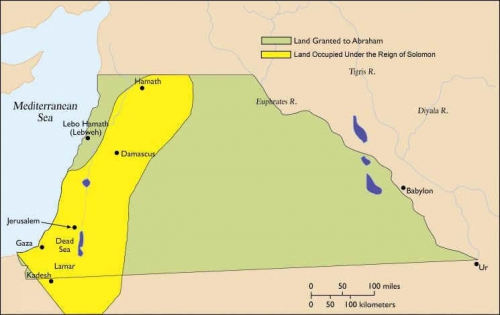
Facilitar el Programa de Desarrollo del Templo
A fin de mantener el Templo en pleno funcionamiento, también es necesario identificar, capacitar y consagrar a los sacerdotes que van a servir en el mismo. De acuerdo con el Libro de los Números, las cenizas de una vaquilla roja pura sin mancha, debe ser previamente ofrecida por un sacerdote ritualmente puro, deben ser mezcladas con agua y rociadas sobre ellos y sobre el mobiliario del Templo. Con la destrucción del Templo en el año 70 las cenizas usadas en la ceremonia se perdieron y los judíos de la diáspora han permanecido por lo tanto ritualmente impuros desde entonces.
En 1998, sin embargo, Clyde Lott, un ganadero Pentecostal de Mississippi, formó Canaan Land Restoration of Israel, Inc. con el propósito de criar de ganado apto para el sacrificio en el Templo [72]. Según la revista Newsweek, en 1997, la primera vaca roja desde hace 2000 años nació en el Kfar Hassidim kibbutz cerca de Haifa y fue llamada ‘Melody’ [73]. Por desgracia, con el tiempo le crecieron pelos blancos en la cola y las ubres. Sin desanimarse, Chaim Richman, un rabino ortodoxo, y Clyde Lott, el ganadero pentecostal, se han unido para inseminar a las vaquillas rojas en el Valle del Jordán, con la esperanza de producir un espécimen perfecto para el sacrificio [74].
El trabajo de diseño y construcción, mobiliario y utensilios, la formación de sacerdotes y la cría de los animales para los sacrificios requiere de fondos y en gran medida, al igual que la vaca roja, éstos están siendo proporcionados por los sionistas cristianos. De acuerdo con Grace Halsell, Stanley Goldfoot elevo a 100 millones de dólares al año las aportaciones para la Jerusalem Temple Foundation a través de la American Christian TV, las estaciones de radio y las iglesias evangélicas [75]. “El anhelo judío del templo, las esperanzas cristianas acerca del Rapto y la paranoia musulmana sobre la destrucción de las mezquitas [es lo que] agita una ebullición apocalíptica” [76].
6. El futuro: la oposición a la paz y el aceleramiento del Armagedon
La Alianza de Estados Unidos e Israel
Jerry Falwell ofrece una explicación simple de la estrecha relación entre Estados Unidos e Israel. Dios ha sido bueno con Estados Unidos porque “Estados Unidos había sido amable con los Judíos” [77]. Gary Bauer, presidente de American Values, se expresó de esta manera. “Los terroristas no entienden por qué Israel y Estados Unidos se unen en el corazón” [78]. Mike Evans, fundador y presidente de los Lovers of Israel Inc. describe la relación especial entre Israel y Estados Unidos: “Sólo una nación, Israel, se encuentra entre… la agresión terrorista y la disminución total de los Estados Unidos como potencia mundial democrática… Sin duda, la presión demoníaca se esforzará en alentar a traicionar a su Israel… Israel es la clave para la supervivencia de Estados Unidos… Ahora que nos encontramos con Israel, creo que veremos a Dios realizar una obra poderosa en nuestros días. Dios va a bendecir a los Estados Unidos e Israel, así… Si Israel cae, los Estados Unidos ya no puede seguir siendo una democracia ” [79].
Para los cristianos sionistas como Falwell y Evans, Estados Unidos es visto como el gran redentor, el papel de la superpotencia en el mundo anunciada en las Escrituras [80] y providencialmente ordenada [81]. Las dos naciones – América e Israel – son percibidas como hermanos siameses que se enfrentan contra un mundo dominado por el mal del comunismo y del Islam, la antítesis de los valores democráticos judeo-cristianos de Estados Unidos e Israel [82].
La antipatía hacia los árabes
Ramon Bennett ilustra cómo estos prejuicios siguen siendo comunes en la actualidad al describir a las naciones árabes modernas como “bárbaros” [83]. “Las costumbres de hospitalidad y generosidad han cambiado poco en 4.000 años“, afirma, “ni tener la costumbre de asaltar (el robo, el robo de ganado), guardar las apariencias o el salvajismo” [84]. Bennett sostiene que el árabe “es, ni un vicioso, ni, por lo general, un mentiroso calculador, sino natural” [85].
Franklin Graham, presidente de Billy Graham Evangelistic Association, hizo comentarios similares pero imprudentes en una entrevista para el diario Charlotte Observer en 2000: “Los árabes no serán felices hasta que cada judío este muerto. Ellos odian al Estado de Israel. Todos odian a los judíos. Dios dio la tierra a los judíos. Los árabes nunca aceptarán eso ” [86].
El odio hacia los árabes se personifica en las actitudes con respecto a Yasser Arafat. En febrero de 1999, por ejemplo, Arafat fue invitado a asistir al 47 ª Congreso anual patrocinado por National Prayer Breakfast en Washington. Al desayuno suelen asistir cada año más de 3.000 líderes políticos y religiosos, pero en esta ocasión la invitación de Arafat generó una considerable controversia. La Traditional Values Coalition, fundada por Pat Robertson y que representa a 40.000 iglesias, instó a los congresistas a boicotear el desayuno [87]. El ICEJ dijo que la asistencia al desayuno con Arafat sería “como orar con el mismo Satanás” [88]. A pesar de una considerable presión de los grupos pro-israelíes la invitación no fue retirada. La Casa Blanca a través del secretario prensa, Joe Lockhart, defendió la invitación. Se lamentó, “se hace cada año con espíritu de reconciliación. Y lo lamentable es que hay algunos que no entienden completamente el espíritu de reconciliación e inclusión “. [89] Pero me temo que esto se pone todavía peor…
Justificando la limpieza étnica de Palestina
Frecuentemente, la defensa de los cristianos sionistas de Israel lleva a negar a los palestinos los mismos derechos humanos básicos de los israelíes. Algunos incluso son reacios a reconocer la existencia de los palestinos como un pueblo distinto. Dave Hunt es el ejemplo típico de aquellos que equiparan a los palestinos con los filisteos antiguos, y el uso de la palabra Palestina es utilizado en un sentido totalmente peyorativo.
“El conflicto central en el Oriente Medio es hoy el problema del llamado pueblo palestino… ¿Palestinos? Nunca hubo un pueblo palestino, nación, lengua, cultura o religión. ¡La reivindicación de descendencia de un pueblo palestino que vivió hace miles de años en una tierra llamada Palestina es una broma! [90].
Basándose en la lógica de Hunt, presumiblemente los mismos argumentos podrían ser utilizados contra el derecho a la libre determinación de los ciudadanos de los Estados Unidos o incluso de varias docenas de naciones fundadas en el siglo XX. La historia de la persecución de los judíos ilustra la facilidad de denigrar un grupo “inferior” de personas o la negación de su existencia como pueblo diferenciado, pudiendo dar lugar a la racionalización de su erradicación.
En mayo del 2002, Dick Armey, el ex líder de la mayoría republicana, fue noticia al justificar la limpieza étnica de palestinos de los Territorios Ocupados. En una entrevista con Chris Matthews en la CNBC el 1 de mayo de 2002, Armey declaró que: “La mayoría de las personas que ahora pueblan Israel fueron trasladadas desde todas partes del mundo para que esa tierra se convirtiera en su hogar. Los palestinos pueden hacer lo mismo y estaremos contentos de trabajar con los palestinos en ello. No estamos dispuestos a sacrificar a Israel por la noción de un estado palestino… me conformo con que Israel tome toda la Ribera Occidental… Hay muchos países árabes que tienen cientos de miles de acres de tierra; la tierra, la propiedad y la oportunidad para crear un Estado palestino ” [91].a
Matthews dio Armey varias oportunidades para aclarar que él no estaba defendiendo la limpieza étnica de los palestinos de Cisjordania, pero Armey no estaba arrepentido. Cuando se le preguntó “¿Alguna vez le dijo a George Bush, el Presidente de su estado natal de Texas, que cree que los palestinos deben irse y abandonar Palestina y que esa era la solución? “, Armey respondió: “Probablemente estoy diciéndoselo en este momento… me conformo con que Israel ocupe esa tierra que ahora ocupan ellos, y que esas personas que han sido agresores de Israel se retiren a otra tierra” [92].
El punto de vista de Armey sobre que los palestinos deben ser “erradicados” es sólo el último de una serie de llamadas, en la corriente principal de EE.UU. y en los medios de comunicación del Reino Unido ,a la limpieza étnica de los palestinos de los Territorios Ocupados [93]. Mientras que tales actitudes racistas entre los cristianos sionistas hacia los árabes son comunes, como lo es la imagen de los palestinos como terroristas, más especialmente demonizados son los musulmanes.
Demonizar el Islam
Los sentimientos anti-árabes y la islamofobia se han convertido en lgo aún más ampliamente tolerado desde el 11 de septiembre de 2001. Estos puntos de vista han sido recientemente descritos como una forma de nuevo “Mc’Cartismo” [94]. En febrero del 2002, por ejemplo, Pat Robertson causó considerable controversia cuando describió al Islam como una religión violenta inclinada a dominar el mundo. También afirmó que entre los musulmanes estadounidenses se estaban formando células terroristas con el fin de destruir el país. Robertson hizo estas acusaciones en su club cristiano Broadcasting Network ‘700 ‘. Después de mostrar clips que mostraban a los musulmanes en Estados Unidos, el locutor, Lee Webb le preguntó a Robertson, “En cuanto a los inmigrantes musulmanes Pat, deja que te pregunte, si tienen tal desprecio por nuestra política exterior, ¿por que querrían vivir aquí? Robertson dijo: “Bueno, como misioneros, posiblemente, para difundir la doctrina del Islam… He discrepado con nuestro Presidente con respecto a su postura de decir que el Islam es una religión pacífica. Puesto que no lo es. Y el Corán lo deja muy claro, si usted ve a un infiel, usted debe matarlo… el hecho es que nuestras políticas de inmigración son tan sesgadas hacia el Medio Oriente y alejadas de Europa que han introducido estas personas entre nosotros y, sin duda, hoy hay células terroristas por todos lados” [95].
En el 2002 en la Convención Bautista del Sur [96] , celebrada en Florida, el ex líder de la convención nacional, el reverendo Jerry Viñes, pastor de 25.000 miembros de la First Baptist Church de Jacksonville, se llevó aplausos de varios miles de participantes de la conferencia de los pastores cuando describió a Muhammad como “un pedófilo poseído por el demonio” [97], tal inquina hacia los árabes, la denigración de los palestinos y el odio hacia el Islam, conduce invariablemente a los cristianos sionistas a oponerse también a cualquier solución pacífica del conflicto árabe-israelí que podría requerir u obligar a Israel a ceder territorio o a comprometer su seguridad.
Oponerse al Proceso de Paz
Mientras que los cristianos sionistas aprueban la reclamación unilateral de Israel de los territorios ocupados, se oponen a las aspiraciones de los palestinos a la autodeterminación, ya que creen que los dos son intrínsecamente incompatibles. Los sionistas cristianos han sido los más vociferantes en su oposición a la Hoja de Ruta para la Paz, iniciativa del gobierno de EE.UU., de las Naciones Unidas, de la Comunidad Europea y de Rusia. Hal Lindsey, por ejemplo, se lamentaba de “Yo tengo el corazón roto por la última etapa de la” hoja de ruta para la paz “, y lo describió como un lugar “odisea hacia el Holocausto ” [98]. Luego pasó a reprender al presidente de los EE.UU..
“Yo me sentía enfermo al ver a un bien intencionado presidente de Estados Unidos cristiano hablar incesantemente sobre su visión de un Estado Palestino y de un Estado Judío viviendo juntos en paz” [99]. En la Cumbre Interfaith Zionist Leadership, celebrada en Washington, en mayo del 2003, judíos y líderes sionistas cristianos se reunieron para estudiar la forma de convertir la “hoja de ruta” en una barricada. Gary Bauer llamó a la iniciativa del presidente “un plan satánico” [100]. Para muchos cristianos sionistas, las conversaciones de paz no son sólo una pérdida de tiempo, demuestran ser un desafío rebelde ante los designios de Dios. Tales certezas infalibles llevan a algunos cristianos sionistas a anatemizar a aquellos que no comparten sus premisas.
Forzar la mano de Dios
Los sionistas cristianos a menudo tratan de silenciar a los críticos con la amenaza de un castigo divino. Por ejemplo, recientemente Hal Lindsey dijo: “Mi gran temor es que el presidente Bush por ignorancia, conduzca a los Estados Unidos ante el juicio de Dios. Dios nos ha advertido que ha de juzgar a todas las naciones que han contribuido a separar a Israel de vivir en la tierra sobre la cual les dio su soberanía” [101].
Los cristianos no dejan ninguna duda sobre de qué lado hay que estar. En la edición del 1 de enero del 2002 del CBN 700 Club, Pat Robertson advirtió que si los EE.UU: “Quieren interferir con la profecía bíblica y quieren entrar y arrebatar Jerusalén Este a los Judios y dársela a Yasser Arafat… que el cielo ayude a nuestra nación… Si Estados Unidos toma Jerusalén Este y la convierte en la capital del Estado Palestino, entonces estamos pidiendo que la ira de Dios caiga sobre esta nación ” [102].
Robertson sugiere que incluso el asesinato de Rabin fue un acto de Dios, un juicio por su traición a su propio pueblo: “Esto es la tierra de Dios y Dios tiene palabras fuertes acerca de quien separe y divida su tierra. Los rabinos enviaron una maldición sobre Yitzhak Rabin cuando comenzó a dividir la tierra ” [103].
Tales pronunciamientos provenientes de los líderes cristianos de gran influencia parecen poco diferentes de los de los fundamentalistas musulmanes que piden una “guerra santa” contra Occidente. Karen Armstrong señala que el sionismo cristiano occidental evidencia el legado de las cruzadas. Fundamentalistas, según ella, “estamos volviendo a una cruzada religiosa clásica y extrema” [104].
7. Conclusiones: Las implicaciones políticas del sionismo cristiano
Hemos visto cómo el sionismo cristiano es un movimiento que tiene consecuencias políticas profundas y destructivas. El sionismo cristiano ha mostrado diferentes grados en su entusiasmo por la aplicación de seis convicciones teológicas que surgen de su lectura literal y futurista de la Biblia:
1. La creencia de que los judíos siguen siendo el pueblo elegido de Dios lleva a los cristianos sionistas a justificar la ocupación militar israelí de Palestina.
2. Como el pueblo escogido de Dios, la restauración final de los judíos en Israel es por lo tanto, fomentada y facilitada activamente a través de alianzas entre las organizaciones cristianas y la Agencia Judía.
3. Eretz Israel, como se expone en las Escrituras, pertenece exclusivamente al pueblo judío, por lo tanto, la tierra debe ser anexada, los asentamientos adoptados y reforzados.
4. Jerusalén es considerada como la capital eterna y exclusiva de los judíos, y no se puede compartir con los palestinos. Por lo tanto, estratégicamente, los gobiernos occidentales se deben de colocar bajo la presión de los cristianos sionistas para trasladar sus embajadas a Jerusalén y por lo tanto reconocer el hecho.
5. El Tercer Templo aún no se ha construido, el sacerdocio no se ha consagrado y los sacrificios no han sido restituidos. Los cristianos sionistas, en particular, creen que esto está profetizado, por lo cual, ofrecen distintos grados de apoyo a las organizaciones del Monte del Templo judío comprometidas a lograrlo.
6. Puesto que los sionistas cristianos están convencidos de que habrá una guerra apocalíptica entre el bien y el mal en un futuro cercano, no hay perspectivas de una paz duradera entre los judíos y los árabes. De hecho, defender el compromiso de Israel con el Islam o la coexistencia con los palestinos es identificarse con aquellos destinados a oponerse a Dios y a Israel en la inminente batalla del Armagedón.
Evidentemente, no todos los cristianos sionistas aceptan estos puntos de vista con el mismo grado de convicción o participación. Sin embargo, las consecuencias generales del apoyo incondicional al Estado de Israel, especialmente entre los evangélicos, es inherentemente patológica y destructiva.
En la primera gran conferencia internacional y ecuménica para examinar esta cuestión, celebrada en Jerusalén en abril de este año, bajo los auspicios de Sabeel, más de 600 delegados afirmaron una declaración que incluía lo siguiente:.
“Rechazamos las enseñanzas heréticas del sionismo cristiano que facilita y ayudan… una forma de exclusividad racial y la guerra perpetua en lugar del evangelio del amor universal, redención y reconciliación enseñado por Jesucristo“.
En lugar de condenar al mundo a la destrucción del Armagedón hacemos un llamamiento a todos a liberarse de las ideologías del militarismo y la ocupación, y en su lugar, seguir la curación del mundo…
Vamos a defender la justicia. ¿Podemos hacer otra cosa?. Sólo la justicia garantiza una paz que conduzca a la reconciliación y a una vida de seguridad y prosperidad para todos los pueblos de nuestra tierra. Al estar en el lado de la justicia, nos abrimos a la obra de la paz – y el trabajar por la paz nos hace hijos de Dios “.
Garth Hewitt ha escrito muchas canciones sobre la situación de la comunidad cristiana en Israel y Palestina. Uno de ellas, sobre la base de algunos versículos del Talmud judío, se llama “Ten measures of beauty God gave to the world“. Me gustaría terminar con una parte de esta oración.
“Que la justicia de Dios caiga como el fuego
y traiga un hogar para los palestinos.
Que la misericordia de Dios se derrame como lluvia
y protega al pueblo judío.
Y que los bellos ojos de un Dios Santo
que llora por sus hijos
Traiga la esperanza de curación para sus heridas
para los judíos y los palestinos.
Notas
1.- Mike Evans, Israel, America’s Key to Survival, (Plainfield, NJ: Haven Books), la última página, p. xv.
2.- Dale Crowley, ‘Errors and Deceptions of Dispensational Teachings.’ Capital Hill Voice, (1996-1997), citado en Halsell, op.cit., P5. Grace Halsell define al sionismo cristiano como una secta. Ver Halsell, op.cit., P. 31.
3.- Grace Halsell, ‘Israeli Extremists and Christian Fundamentalists: The Alliance’, Washington Report, December (1988), p31.
4.- Christians Call for a United Jerusalem’ New York Times, 18 April (1997)
5.- Halsell, Forcing, op.cit., p50.
6.- Halsell, Forcing, op.cit., p50.
7.- Grace Halsell, Prophecy and Politics, (Westport, Connecticut, Lawrence Hill, 1986), p 178.
8.- www.israelunitycoalition.com
9.- Stanley J. Grenz, The Millennial Maze, (Downers Grove, Illinois, InterVarsity, 1992), p92; Hal Lindsey, The Late Great Planet Earth, (London, Lakeland, 1970), pp43, 53-58; Hannah Hurnard, Watchman on the Walls, (London, Olive Press, 1950), pp11-12.
10.- Louis T. Talbot & William W. Orr, The Nation of Israel and the Word of God!, (Los Angeles, Bible Institute of Los Angeles, 1948), p8.
11.- Donald Wagner, ‘Evangelicals and Israel: Theological Roots of a Political Alliance’ The Christian Century, Noviembre 4, (1998), pp1020-1026.
12.- Jimmy Carter, The Blood of Abraham, (London, Sidgwick & Jackson, 1985).
13.- Speech by President Jimmy Carter on 1 May 1978, Department of State Bulletin, vol. 78, No. 2015, (1978), p4, cited in Sharif, op.cit., p136.
14.- Donald Wagner, ‘Beyond Armageddon’, The Link, New York: Americans for Middle East Understanding; Octubre-Noviembre, (1992), p5.
15.- Halsell, Prophecy., op.cit., p47
16.- Ibid.
17.- Ronnie Dugger, ‘Does Reagan Expect a Nuclear Armageddon?’ Washington Post, 18 Abril (1984).
18.- George Bush, Speech to the American Jewish Committee, Mayo 3, (2001)
19.- Michael Lind, ‘The Israel Lobby and American Power’ Prospect, Abril (2002), pp22-29; Halsell, Prophecy., op.cit.
20.- Israel Shahak, “Ability of U.S. Jewish Groups to set Clinton Agenda Depends on Media.” Washington Report, Junio 1995, pp. 10, 94.
21.- Publisher’s Page, Washington Report, Junio 1995, pp. 122.
22.- Ibid.
23.- Allan C. Brownfeld, ‘Fundamentalists and the Millennium: A Potential Threat to Middle Eastern Peace’ The Washington Report, Junio (1999), pp82-84.
24.- Donald Wagner, ‘Evangelicals and Israel: Theological Roots of a Political Alliance.’ The Christian Century, Noviembre 4, (1998), pp1020-1026.
25.- Brownfeld, op.cit., pp82-84.
26.- Wagner, ‘Evangelicals’, op.cit., pp1020-1026.
27.- www.nljonline.com
28.- Wagner, ‘Evangelicals’, op.cit., pp1020-1026.
29.- Brownfeld, op.cit., pp82-84.
30.- Jerry Falwell
31.- Las reuniones regulares entre los líderes cristianos sionistas y los funcionarios israelíes tienen lugar en Harvard Business School. En algún lugar a principios de 2002, los participantes incluyeron a Avigdor Itzchaki, el Director General del Gabinete Israeli, James Watt, ex-Secretario del Interior, Mike Evans y Richard Hellman de CIPAC. Entre los invitados también estaban Tony Campolo, James Dobson, Kenneth Copeland, Robert Schuller, Chuck Smith, Joyce Meyers, E.V. Hill y Marlin Maddoux.
32.- Citado en Prior, op.cit., p143.
33.- Hal Lindsey, ‘The UN & Israel’ International Intelligence Briefing, 29th Octubre (1998): Énfasis en el original.
34.- En Julio del 2001 el Consejo Rabínico de Judea, Samaria y Gaza, pidió a todos los rabinos a llevar a sus comunidades a visitar el Monte del Templo. Esta fue la primera vez que un grupo de rabinos que representan una proporción significativa de la comunidad religiosa judía había decidido que era permisible para los judíos ascender al Monte del Templo. Anteriormente esto había sido prohibido por los judíos ortodoxos. Los rabinos también pidieron al Consejo Yesha de asentamientos judíos de organizar visitas masivas al Monte del Templo de los judíos de la derecha más religiosa de los asentamientos . . Ver N. Shragai, ‘Rabbis call for mass visits to Temple Mount,’ Ha’aretz, 19 July (2001).
35.- ‘Open Letter to Evangelical Christians from Jews for Jesus: Now is the Time to Stand with Israel.’ The New York Times, 23 Octubre (2000).
36.- Michael Lind, ‘The Israel Lobby’, Prospect, April (2002).
37.- Wagner, Anxious., op.cit., p107.
38.- Lind, op.cit.
39.- Ibid.
40.- Ibid.
41.- Ibid.
42.- Shirley Eber, ‘Getting Stoned on Holiday: Tourism on the Front Line’. In Focus: Tourism Concern. 2, Otoño (1991), pp4-5.
43.- Glen Owen ‘Tourists warned to avoid flashpoints.’ The Times, 14 Agosto (1997), p2.
44.- Don Wagner, ‘Beyond Armageddon’. The Link (Americans for Middle East Understanding) Vol. 25 No. 4 Octubre/Noviembre (1992) p. 3.
45.- ‘Aliyah’ significa ‘subir’ y se utiliza para describir la peregrinación a Jerusalén. El gobierno de Israel resta importancia a la participación de los cristianos en llevar judíos desde la antigua Unión Soviética. Brearley afirma que sólo el 2% del presupuesto de la Agencia Judía de ‘puente aéreo’ para los inmigrantes soviéticos ha sido aportados por los sionistas cristianos. Esto sólo incluye las donaciones hechas directamente a la Agencia Judía. Margaret Brearley, ‘Jerusalem for Christian Zionists’ in Jerusalem, Past an d Present in the Purposes of God, edited by P.W.L. Walker (Croydon, Deo Gloria Trust, 1992), p112. Ver www.christiansforisrael.org
46.- www.christiansforisrael.org
47.- Patricia Golan, ‘On Wings of Faith’ Jerusalem Post, 20 Diciembre 2001.
48.- Ibid.
49.- Wagner, op.cit., p108; Golan, op.cit.
50.- David Allen Lewis, ‘Christian Zionist Theses’, Christians and Israel, (Jerusalem, International Christian Embassy, Jerusalem, 1996), p9.
51.- Bridges for Peace ‘The Golan Heights Déjà vu’, Despatch from Jerusalem, Septiembre (1999), pp10-11.
52.- ‘Israeli Settlements in the Occupied Territories’ Foundation for Middle East Peace, Marzo (2002). FMEP da una lista de 190 asentamientos con una población total de 213.672 en Cisjordania y Gaza; 170.400 en Jerusalén Este, y 17.000 en los Altos del Golán, lo que hace un total de 401.072 colonos basado en cifras de 2001.
53.- www.cfoic.com
54.- Ibid.
55.- Wagner, Anxious, op.cit., p108.
56.- International Christian Embassy; ‘Life in the Settlements’, Word from Jerusalem, Mayo (2002), p7.
57.- International Christian Embassy, ‘Bulletproof Bus for Efrat’ appeal, Word from Jerusalem, Mayo (2002).
58.- Bridges for Peace, ‘New Life on the Farm’ Despatch from Jerusalem, Enero (2000), p5.
59.- Donald Wagner, Anxious, op.cit., p108.
60.- ‘Bill to re-locate the United States Embassy from Tel Aviv to Jerusalem’
61.- Middle East Realities ‘Lie of the Week’ MiddleEast@aol.com , 01/11/95
62.- Donald Neff, ‘Congress has been irresponsible on the issue of Jerusalem’, Washington Report, Enero (1998), pp90-91.
63.- ‘Christians Call for a United Jerusalem’ New York Times, 18 Abril (1997)
64.- Ibid.
65.- Jerry Falwell Ministries, ‘Keep Jerusalem Free Petition,’
66.- Brickner, Future, op.cit., p137.
67.- Lindsey, Planet, op.cit., p156; Final, op.cit., p103.
68.- Rich Robinson, ‘Israeli Groups Involved in Third Temple Activities’ Jews for Jesus Newsletter 10, (1993).
69.- Nadav Shragai, ‘Dreaming of a Third Temple’, Ha’aretz, 17 Septiembre (1998), p3, citado en Price, Coming, op.cit., p417.
70.- Sam Kiley, ‘The righteous will survive and the rest will perish’ The Times, 13 Diciembre (1999), p39.
71.- Grace Halsell, ‘The Hidden Hand of the Temple Mount Faithful’ The Washington Report, Enero (1991), p8.
72.- Randall Price incorrectamente atribuyó la historia al Time cuando realmente apareció en Newsweek. Él también escribe mal uno de los nombres del contribuyente. Price, Coming, op.cit., p375. ‘Red Heifers’ New York Times, 27 Diciembre (1998), citado en Halsell, Forcing, p65.
‘Poco después de esto, el Rev. Lott (que también es un ganadero de profesión) llegó a poseer una vaca roja que cumplió con todos los requisitos bíblicos del capítulo 19 de Números. Desde ese momento histórico, 11 de noviembre de 1994, Dios milagrosamente dio a conocer su plan divino para la restauración de Israel, a la Iglesia. El Espíritu Santo ha trabajado durante este tiempo para revelar a los ministros apostólicos y laicos la necesidad de unificar sus esfuerzos con el fin de ver este movimiento hacia adelante, tanto en Espíritu como en lo material. El 11 de agosto de 1998 Israel estaba a la espera de recibir de Canaan Land Restoration, 500 cabezas de novillas registrados por Red Angus Heifers.’ Joe Atkins, ‘Biblical mystery of the red heifer affects farmer in Mississippi’ The Daily Mississippian, 23 de julio (1998), Ethan Bronner, ‘Portent in a Pasture? Appearance of Rare Heifer in Israel Spurs Hopes, Fears’, The Boston Globe, Sunday, Abril 6, (1997), pp1, 22.
73.- Kendall Hamilton, Joseph Contreras & Mark Dennis, ‘The Strange Case of Israel’s Red Heifer,’ Newsweek, Mayo 19, (1997).
74.- Jeremy Shere, ‘A Very Holy Cow’ Jerusalem Post, Mayo 25, (1997).
75.- Halsell, Prophecy, op.cit., p106.
76.- Lawrence Wright, ‘Forcing the End’, Frontline.
77.- Cited in Halsell, Forcing, op.cit., p100.
78.- Julia Duin, “Zionists meeting brands ‘road map a heresy’ The Washington Times,.
79.- Mike Evans, Israel, America’s Key to Survival, (Plainfield, New Jersey, Haven Books, 1980), back page, xv.
80.- Noah Hutchings, U.S. in Prophecy, (Oklahoma City, Hearthstone Publishing, 2000); Arno Froese, Terror in America, Understanding the Tragedy, (West Columbia, Olive Press, 2001); Mark Hitchcock, Is America in Prophecy? (Portland, Oregon, Multnomah, 2002); Hal Lindsey, Where is America in Prophecy? video (Murrieta, California, Hal Lindsey Ministries, 2001).
81.- Michael Lienesch, Redeeming America: Piety and Politics in the New Christian Right, (Chapel Hill, North Carolina, University of North Carolina, 1993), p197.
82.- Simon, op.cit., pp71-72.
83.- Bennett, op.cit., p23.
84.- Ibid., p21.
85.- Ibid., p23; John Laffin, The Arab Mind, (London, Cassell, 1975), p70.
86.- Charlotte Observer, 16 Octubre (2000).
87.-Christian Daily News, 4 Febrero, (1999)
88.- Ibid.
89.- Ibid.
90.- Dave Hunt, ‘O Jerusalem, Jerusalem.’ TBC, Septiembre 2000.
91.- Dick Armey, ‘Hardball with Chris Matthews’, CNBC, 1 Mayo (2002), citado en ‘Republican Party Leader calls for Ethnic Cleansing of Palestinians on Prime Time Talk Show’ The Electronic Intifada.
También ver ‘Rep. Dick Armey calls for Ethnic Cleansing of Palestinians’ Counterpunch editado por Alexander Cockburn y Jeffrey St. Clair. Dick Armey and his family are members of Lewisville Bible Church, Lewisville, Texas.
92.- Ibid.
93.- Charles Krauthammer, ‘Mideast Violence: The Only Way Out’, Washington Post, 15 Mayo (2001); Emmanuel A. Winston writing in USA Today called for the ‘resettling the Palestinians in Jordan’ USA Today, 22 Febrero (2002); John Derbyshire, ‘Why don’t I care about the Palestinians?’, National Review, 9 Mayo (2002); Clarence Wagner, ‘Apples for Apples, Osama Bin Laden and Yasser Arafat’, Dispatch from Jerusalem, Mayo (2002), p1, 6, 17.
94.- Un término acuñado por William Safire, un ex redactor de discursos de Nixon y republicano conservador que pensaba George Bush padre no era lo suficientemente pro-Israel. Citado Lind, op.cit.
95.- Alan Cooperman, ‘Robertson Calls Islam a Religion of Violence, Mayhem.’ Washington Post. 22 Febrero (2002), pAO2.
96.- The Southern Baptist Convention es una coalición de 42,000 iglesias con 16 millones de miembros. Desde 1980 se han ido convertido cada vez en más fundamentalista. Ver www.sbcannualmeeting.org
97.- Richard Vara, ‘Texas secession rumor, attacks on Islam mark Baptist meeting’, Houston Chronicle, 10 Junio (2002); Alan Cooperman, ‘Anti-Muslim Remarks Stir Tempest’, Washington Post 19 Junio (2002). De acuerdo con Cooperman, el recién elegido presidente de Southern Baptists, el Rev. Jack Graham defendió discurso Vine como “exacto’.
98.- Hal Lindsey, ‘If the blind lead the blind.’ WorldNetDaily.com 5 Junio 2003.
99.- Ibid.
100.- Duin, op.cit.
101.- Lindsey “Blind” op.cit.
102.- Howard Mortman, ‘Don’t ignore Pat Robertson’, The Frontline, 7 Enero (2002).
103.- Pat Robertson, ‘Pat answers your questions on Israel,’ 700 Club, Christian Broadcasting Network.
104.- Karen Armstrong, Holy War, The Crusades and Their Impact on Today’s World, (London, Macmillan, 1988), p377.
*Stephen Sizer es pastor anglicano, autor, productor de tv y reportero gráfico.



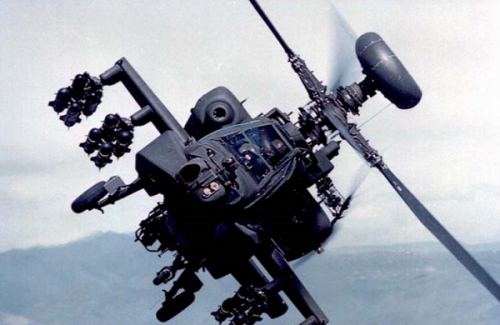

 del.icio.us
del.icio.us
 Digg
Digg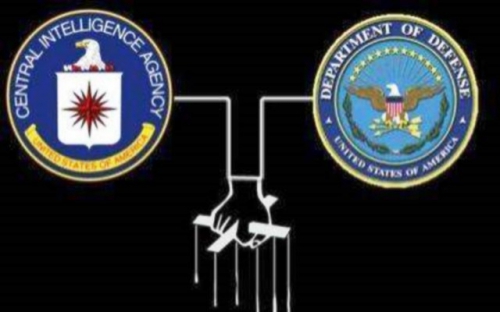
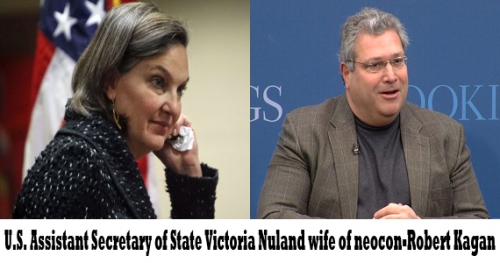
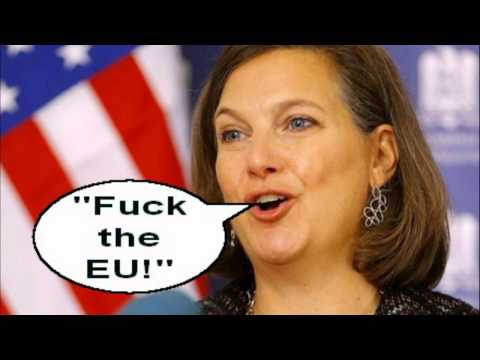 Kagan wants both an American ground attack on IS, which would mean attacks in three or more countries, and NATO in Ukraine. Nuland has constantly made provocative statements about Russia and she supports every move by Washington deeper and deeper into Ukraine’s politics and military campaigns. If Poroshenko is removed from office by another coup, Nuland will be there to influence and control the new leaders. She will anoint and bless them, even if they are neo-nazis.
Kagan wants both an American ground attack on IS, which would mean attacks in three or more countries, and NATO in Ukraine. Nuland has constantly made provocative statements about Russia and she supports every move by Washington deeper and deeper into Ukraine’s politics and military campaigns. If Poroshenko is removed from office by another coup, Nuland will be there to influence and control the new leaders. She will anoint and bless them, even if they are neo-nazis.


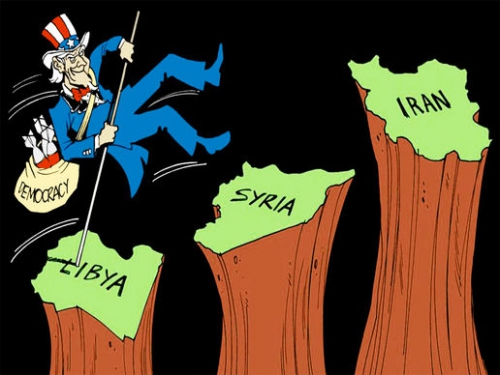

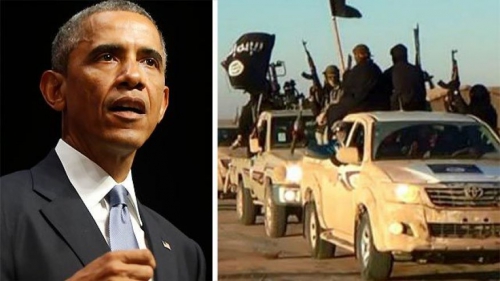
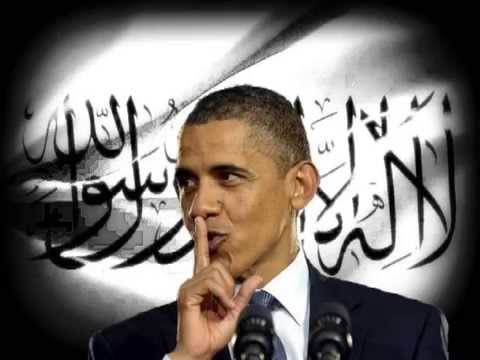
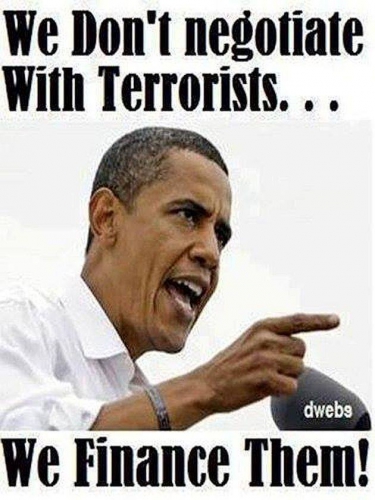 Massaslachting van christenen door moslims doodgezwegen
Massaslachting van christenen door moslims doodgezwegen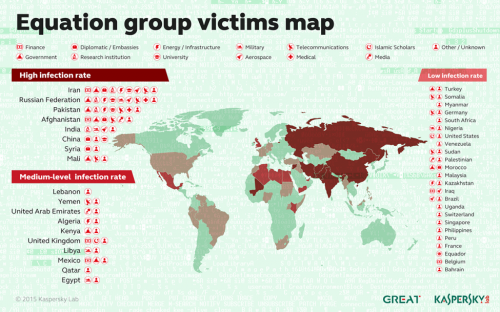
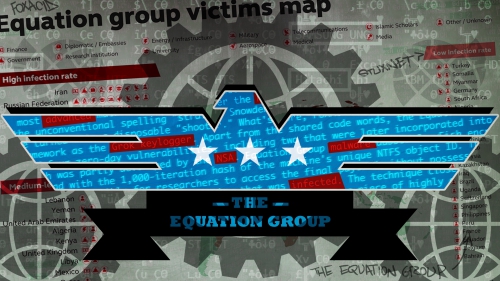
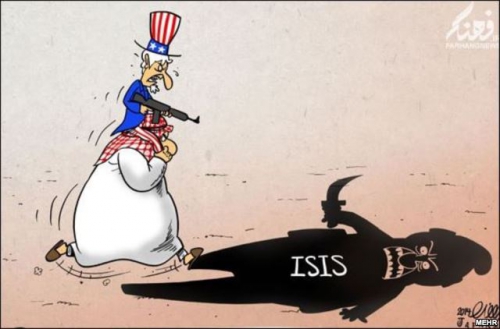
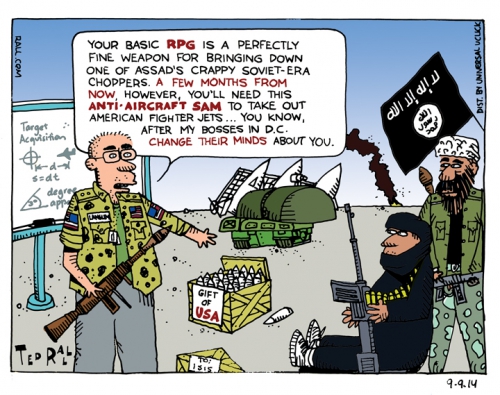
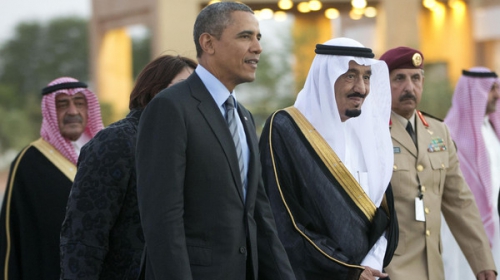
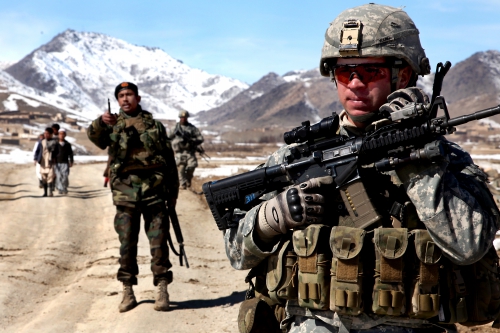
 The Great War of the American Empire encompasses several sub-wars, continual warfare, continual excuses for continual warfare, and continual military engagements that promise Americans more of the same indefinitely. There is a web site called
The Great War of the American Empire encompasses several sub-wars, continual warfare, continual excuses for continual warfare, and continual military engagements that promise Americans more of the same indefinitely. There is a web site called 
 Recall how Obama had declined up to the last minute to order Mubarak to step down, and how Vice President Joe Biden had pointedly declined to describe Mubarak as a dictator. Only when millions rallied against the regime did Obama shift gears, praise the youth of Egypt for their inspiring mass movement, and withdraw support for the dictatorship. After that Obama pontificated that Ali Saleh in Yemen (a key ally of the U.S. since 2001) had to step down in deference to protesters. Saleh complied, turning power to another U.S. lackey (who has since resigned). Obama also declared that Assad in Syria had “lost legitimacy,” commanded him to step down, and began funding the “moderate” armed opposition in Syria. (The latter have at this point mostly disappeared or joined al-Qaeda and its spin-offs. Some have turned coat and created the “Loyalists’ Army” backing Assad versus the Islamist crazies.)
Recall how Obama had declined up to the last minute to order Mubarak to step down, and how Vice President Joe Biden had pointedly declined to describe Mubarak as a dictator. Only when millions rallied against the regime did Obama shift gears, praise the youth of Egypt for their inspiring mass movement, and withdraw support for the dictatorship. After that Obama pontificated that Ali Saleh in Yemen (a key ally of the U.S. since 2001) had to step down in deference to protesters. Saleh complied, turning power to another U.S. lackey (who has since resigned). Obama also declared that Assad in Syria had “lost legitimacy,” commanded him to step down, and began funding the “moderate” armed opposition in Syria. (The latter have at this point mostly disappeared or joined al-Qaeda and its spin-offs. Some have turned coat and created the “Loyalists’ Army” backing Assad versus the Islamist crazies.)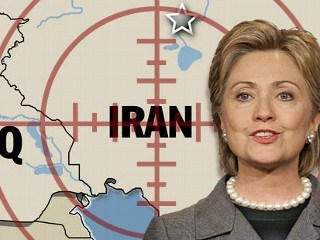 *As New York senator Clinton endorsed the murderous ongoing sanctions against Iraq, imposed by the UN in 1990 and continued until 2003. Initially applied to force Iraqi forces out of Kuwait, the sanctions were sustained at U.S. insistence (and over the protests of other Security Council members) up to and even beyond the U.S. invasion in 2003. Bill Clinton demanded their continuance, insisting that Saddam Hussein’s (non-existent) secret WMD programs justified them. In 1996, three years into the Clinton presidency, Albright was asked whether the death of half a million Iraq children as a result of the sanctions was justified, and famously replied in a television interview, “We think it was worth it.” Surely Hillary agreed with her friend and predecessor as the first woman secretary of state. She also endorsed the 1998 “Operation Desert Fox” (based on lies, most notably the charge that Iraq had expelled UN inspectors) designed to further destroy Iraq’s military infrastructure and make future attacks even easier.
*As New York senator Clinton endorsed the murderous ongoing sanctions against Iraq, imposed by the UN in 1990 and continued until 2003. Initially applied to force Iraqi forces out of Kuwait, the sanctions were sustained at U.S. insistence (and over the protests of other Security Council members) up to and even beyond the U.S. invasion in 2003. Bill Clinton demanded their continuance, insisting that Saddam Hussein’s (non-existent) secret WMD programs justified them. In 1996, three years into the Clinton presidency, Albright was asked whether the death of half a million Iraq children as a result of the sanctions was justified, and famously replied in a television interview, “We think it was worth it.” Surely Hillary agreed with her friend and predecessor as the first woman secretary of state. She also endorsed the 1998 “Operation Desert Fox” (based on lies, most notably the charge that Iraq had expelled UN inspectors) designed to further destroy Iraq’s military infrastructure and make future attacks even easier. What can those who revere her point to in this record that in any way betters the planet or this country? Clinton’s record of her tenure in the State Department is entitled Hard Choices, but it has never been hard for Hillary to choose brute force in the service of U.S. imperialism and its controlling 1%.
What can those who revere her point to in this record that in any way betters the planet or this country? Clinton’s record of her tenure in the State Department is entitled Hard Choices, but it has never been hard for Hillary to choose brute force in the service of U.S. imperialism and its controlling 1%.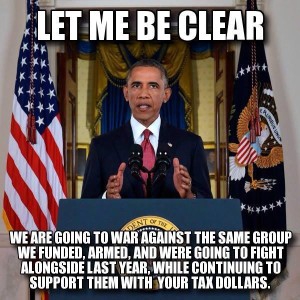 At long last, the Obama administration has submitted a draft resolution to Congress that would authorize the ongoing U.S.-led military intervention against the Islamic State, or ISIS.
At long last, the Obama administration has submitted a draft resolution to Congress that would authorize the ongoing U.S.-led military intervention against the Islamic State, or ISIS. 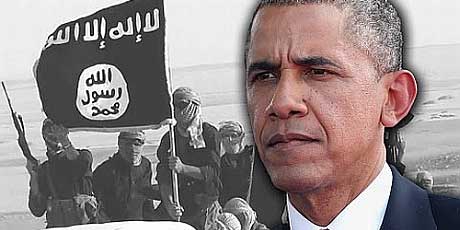 4. It’s a charade. Obama says that the war resolution is necessary to “show the world we are united in our resolve to counter the threat posed by” ISIS. Secretary of State John Kerry added in a statementthat an authorization would send “a clear and powerful signal to the American people, to our allies, and to our enemies.” But as any kid who’s taken middle school civics could tell you, the point of a war resolution is not to “show the world” anything, or “send a signal” to anyone.
4. It’s a charade. Obama says that the war resolution is necessary to “show the world we are united in our resolve to counter the threat posed by” ISIS. Secretary of State John Kerry added in a statementthat an authorization would send “a clear and powerful signal to the American people, to our allies, and to our enemies.” But as any kid who’s taken middle school civics could tell you, the point of a war resolution is not to “show the world” anything, or “send a signal” to anyone. 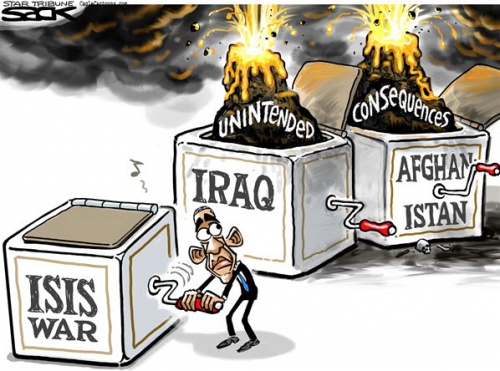
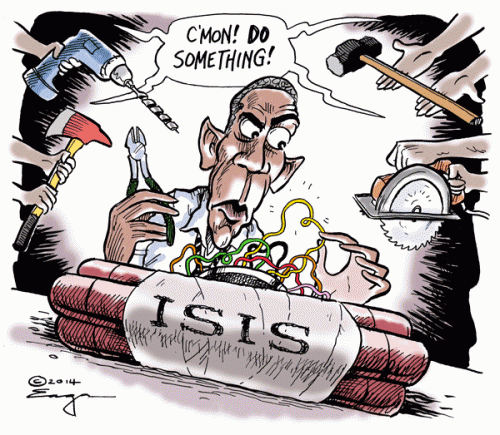
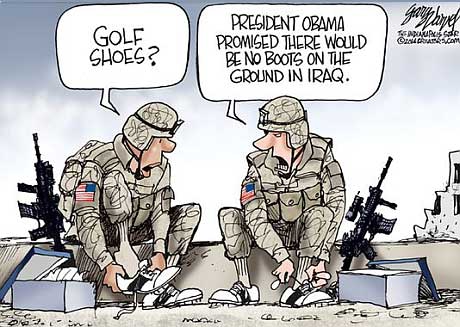
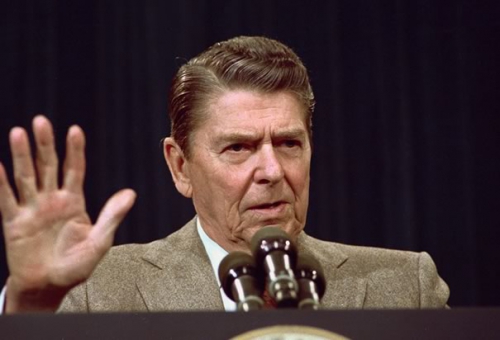

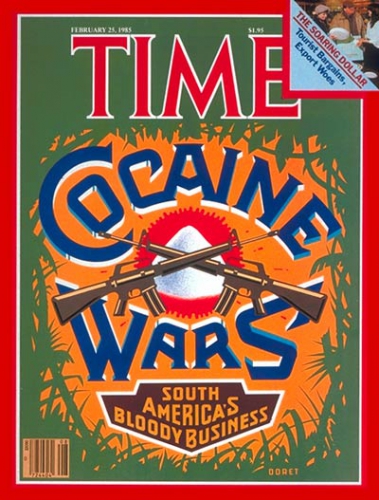 A parallel version of the CIA was set up under Lt. Colonel Oliver North and members of the Bush family, and ratlines were created from the cocaine centers of Colombia, through Noriega’s Panama to the secret landing fields in Costa Rica and ending in America’s cities.
A parallel version of the CIA was set up under Lt. Colonel Oliver North and members of the Bush family, and ratlines were created from the cocaine centers of Colombia, through Noriega’s Panama to the secret landing fields in Costa Rica and ending in America’s cities.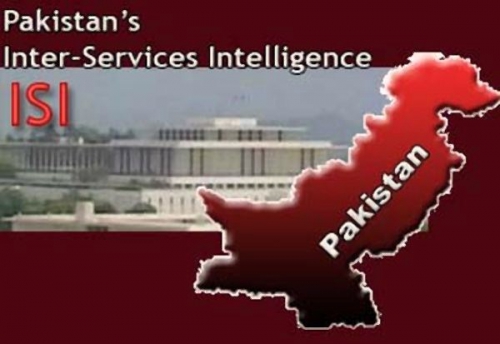

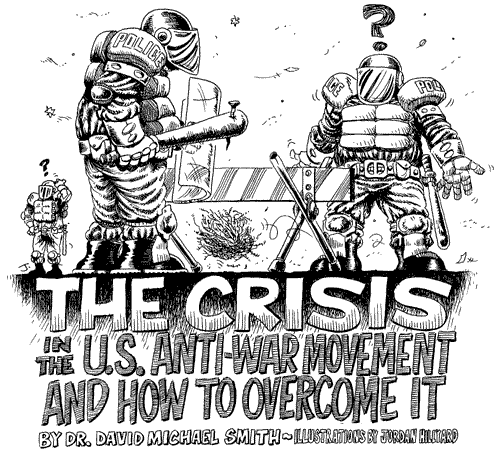
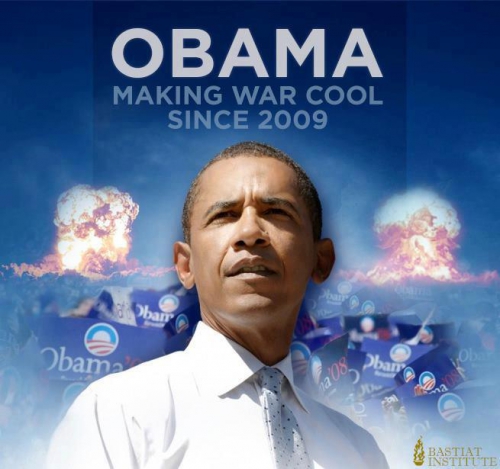


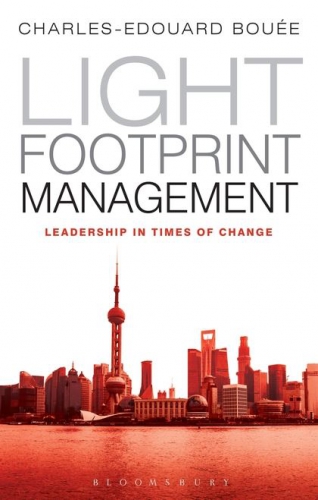 Le président de la Fédération de Russie, Vladimir Poutine, a dénoncé, lors de sa conférence de presse annuelle, jeudi, les visées impérialistes de l'Occident et ses pratiques hégémoniques. «Nos partenaires ont décidé qu'ils étaient les vainqueurs, qu'ils étaient désormais un empire et que les autres étaient des vassaux qu'il faut faire marcher au pas», a-t-il fustigé. Il a accusé les Occidentaux, Etats-Unis en tête, de vouloir «arracher les crocs et les griffes de l'ours russe». 25 ans après la chute du mur de Berlin, ils dressent, selon lui, un nouveau mur entre la Russie et l'Europe. «Il s'agit d'un mur virtuel, mais il commence déjà à être construit», a déclaré le chef de l'État, rappelant l'élargissement de l'Otan jusqu'aux portes de la Russie (pays baltes) et le bouclier antimissile en Europe orientale.
Le président de la Fédération de Russie, Vladimir Poutine, a dénoncé, lors de sa conférence de presse annuelle, jeudi, les visées impérialistes de l'Occident et ses pratiques hégémoniques. «Nos partenaires ont décidé qu'ils étaient les vainqueurs, qu'ils étaient désormais un empire et que les autres étaient des vassaux qu'il faut faire marcher au pas», a-t-il fustigé. Il a accusé les Occidentaux, Etats-Unis en tête, de vouloir «arracher les crocs et les griffes de l'ours russe». 25 ans après la chute du mur de Berlin, ils dressent, selon lui, un nouveau mur entre la Russie et l'Europe. «Il s'agit d'un mur virtuel, mais il commence déjà à être construit», a déclaré le chef de l'État, rappelant l'élargissement de l'Otan jusqu'aux portes de la Russie (pays baltes) et le bouclier antimissile en Europe orientale.

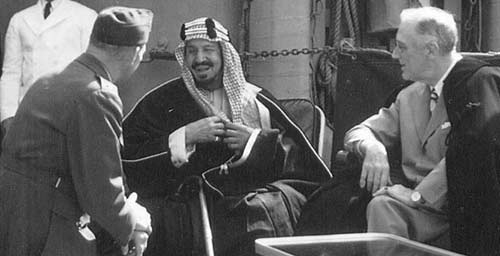
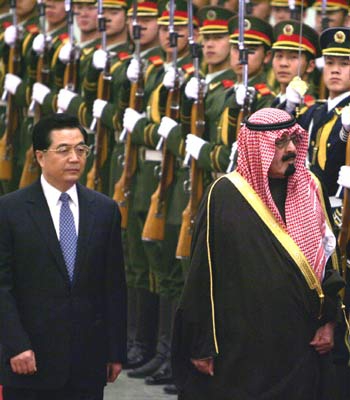 The Saudis have signaled their displeasure in some subtle and some blatant ways in recent years. Perhaps most spectacularly, the Saudis
The Saudis have signaled their displeasure in some subtle and some blatant ways in recent years. Perhaps most spectacularly, the Saudis 
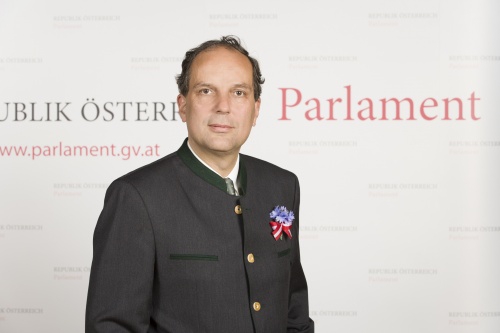
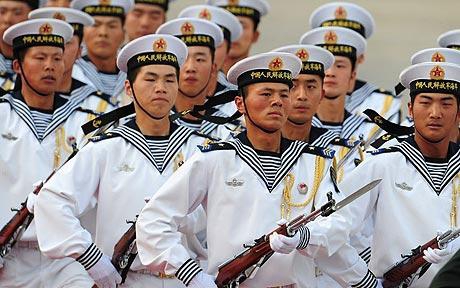 Q. : La Chine craint d’être encerclée par les Etats-Unis ; Washington cherche à installer un système antimissiles en Asie orientale, sous le prétexte du danger nord-coréen. Dans quelle mesure ces plans pourront-ils contribuer à envenimer le climat dans l’espace Asie-Pacifique ?
Q. : La Chine craint d’être encerclée par les Etats-Unis ; Washington cherche à installer un système antimissiles en Asie orientale, sous le prétexte du danger nord-coréen. Dans quelle mesure ces plans pourront-ils contribuer à envenimer le climat dans l’espace Asie-Pacifique ?
 En 1976, una serie de acontecimientos llevaron al sionismo cristiano a la vanguardia de la política dominante de EE.UU.. Jimmy Carter fue elegido como el “renacido” presidente que marcaría el apoyo de la derecha evangélica. En Israel, Menachem Begin y el ala derecha del partido Likud llegaron al poder al año siguiente. Una coalición tripartita emergió lentamente entre la derecha política, los evangélicos y el lobby judío. En 1978, Jimmy Carter reconoció cómo sus propias creencias pro-sionistas habían influido en su política en Oriente Medio [12]. En un discurso, describió el estado de Israel como “un retorno al pasado, a la tierra bíblica de la cual los Judíos fueron expulsados tantos cientos de años atrás… El establecimiento de la nación de Israel es el cumplimiento de la profecía bíblica y la esencia misma de su cumplimiento ” [13]. Sin embargo, cuando Carter vaciló sobre el agresivo programa del Likud y propuso la creación de un estado palestino, se distanció de la coalición de judíos pro- israelí, lo que condujo a que los evangélicos cambiaran su apoyo a Ronald Reagan en las elecciones de 1980. La elección de Reagan como presidente dio un impulso considerable a la causa sionista cristiana. Don Wagner explica: “La elección de Ronald Reagan marcó el comienzo no sólo de una tendencia aun más pro-Israel en la historia de la administración, sino que además dio importantes puestos en el gobierno a varios prominentes cristianos sionistas. Además del Presidente, quiene se suscribe a una teología premilenarista futurista y al sionismo cristiano, podemos mencionar al Procurador General Ed Meese, al Secretario de Defensa Casper Weinberger, y al secretario del Interior James Watt” [14].
En 1976, una serie de acontecimientos llevaron al sionismo cristiano a la vanguardia de la política dominante de EE.UU.. Jimmy Carter fue elegido como el “renacido” presidente que marcaría el apoyo de la derecha evangélica. En Israel, Menachem Begin y el ala derecha del partido Likud llegaron al poder al año siguiente. Una coalición tripartita emergió lentamente entre la derecha política, los evangélicos y el lobby judío. En 1978, Jimmy Carter reconoció cómo sus propias creencias pro-sionistas habían influido en su política en Oriente Medio [12]. En un discurso, describió el estado de Israel como “un retorno al pasado, a la tierra bíblica de la cual los Judíos fueron expulsados tantos cientos de años atrás… El establecimiento de la nación de Israel es el cumplimiento de la profecía bíblica y la esencia misma de su cumplimiento ” [13]. Sin embargo, cuando Carter vaciló sobre el agresivo programa del Likud y propuso la creación de un estado palestino, se distanció de la coalición de judíos pro- israelí, lo que condujo a que los evangélicos cambiaran su apoyo a Ronald Reagan en las elecciones de 1980. La elección de Reagan como presidente dio un impulso considerable a la causa sionista cristiana. Don Wagner explica: “La elección de Ronald Reagan marcó el comienzo no sólo de una tendencia aun más pro-Israel en la historia de la administración, sino que además dio importantes puestos en el gobierno a varios prominentes cristianos sionistas. Además del Presidente, quiene se suscribe a una teología premilenarista futurista y al sionismo cristiano, podemos mencionar al Procurador General Ed Meese, al Secretario de Defensa Casper Weinberger, y al secretario del Interior James Watt” [14]. El poder del lobby pro-israelí asegura que Israel siga recibiendo entre 3 a 8 millones de dólares anuales de los EE.UU. en subvenciones, préstamos y subsidios, y ayuda militar. Este poder se puede medir por el hecho de que George Bush padre fue el último Presidente de los EE.UU. en criticar a Israel en público. Durante la Guerra del Golfo, causó disgusto en el lobby israelí que presionara a Israel para no tomar represalias contra los ataques de Irak, y prometió a los socios de la coalición árabe que él se ocuparía de la cuestión palestina. En septiembre de 1991, se quejó de que “hay 1.000 lobbystas en la colina del Congreso, presionando por las garantías de los préstamos para Israel, y soy un tipo un poco solitario aquí pidiendo al Congreso retrasar el examen de las garantías de préstamos por 120 días” [ 38]. Lind señala que el lobby pro-israelí también fue responsable de fomentar, “el mayor abuso del poder de indulto presidencial en la historia estadounidense“, cuando Bill Clinton, en su último día en el cargo, dio un polémico indulto a Mark Rich, el multimillonario fugitivo que en la lista del FBI figuraba como el “más buscado“. En un artículo del New York Times en febrero de 2001, Clinton explicó que lo había hecho por Israel:
El poder del lobby pro-israelí asegura que Israel siga recibiendo entre 3 a 8 millones de dólares anuales de los EE.UU. en subvenciones, préstamos y subsidios, y ayuda militar. Este poder se puede medir por el hecho de que George Bush padre fue el último Presidente de los EE.UU. en criticar a Israel en público. Durante la Guerra del Golfo, causó disgusto en el lobby israelí que presionara a Israel para no tomar represalias contra los ataques de Irak, y prometió a los socios de la coalición árabe que él se ocuparía de la cuestión palestina. En septiembre de 1991, se quejó de que “hay 1.000 lobbystas en la colina del Congreso, presionando por las garantías de los préstamos para Israel, y soy un tipo un poco solitario aquí pidiendo al Congreso retrasar el examen de las garantías de préstamos por 120 días” [ 38]. Lind señala que el lobby pro-israelí también fue responsable de fomentar, “el mayor abuso del poder de indulto presidencial en la historia estadounidense“, cuando Bill Clinton, en su último día en el cargo, dio un polémico indulto a Mark Rich, el multimillonario fugitivo que en la lista del FBI figuraba como el “más buscado“. En un artículo del New York Times en febrero de 2001, Clinton explicó que lo había hecho por Israel: Para el sionismo religioso, judío y cristiano, las fronteras legítimas de Israel son considerablemente mayores que las que actualmente se disputa con Siria, Jordania y la Autoridad Palestina. La participación cristiana en la realización de la Tierra de Israel incluye la justificación militar de la ampliación de estas fronteras, la adopción de políticas del programa de asentamientos, y el apoyo económico para el movimiento de los colonos. Por ejemplo, David Allen Lewis, presidente de Christians United for Israel, sitúa las reivindicaciones territoriales de Israel en el contexto más amplio del Oriente Medio. Observa que “Los árabes ya tienen el 99,5 por ciento de la tierra… esto no puede ser tolerado” [50]. En respuesta a los llamamientos internacionales para que Israel devuelva la Ribera Occidental, Bridges for Peace hace la siguiente pregunta retórica: “¿Qué es tan sagrado con respecto a la línea establecida el 04 de junio 1967?” Nada, dice, ya que históricamente esto era parte del Israel bíblico y “justamente ganado en batallas defensivas en 1967 y 1973” [51]. Esta convicción de que toda la Ribera Occidental es parte integral de Israel ha llevado a muchos cristianos sionistas a “adoptar” los asentamientos judíos para reforzar su derecho a la tierra.
Para el sionismo religioso, judío y cristiano, las fronteras legítimas de Israel son considerablemente mayores que las que actualmente se disputa con Siria, Jordania y la Autoridad Palestina. La participación cristiana en la realización de la Tierra de Israel incluye la justificación militar de la ampliación de estas fronteras, la adopción de políticas del programa de asentamientos, y el apoyo económico para el movimiento de los colonos. Por ejemplo, David Allen Lewis, presidente de Christians United for Israel, sitúa las reivindicaciones territoriales de Israel en el contexto más amplio del Oriente Medio. Observa que “Los árabes ya tienen el 99,5 por ciento de la tierra… esto no puede ser tolerado” [50]. En respuesta a los llamamientos internacionales para que Israel devuelva la Ribera Occidental, Bridges for Peace hace la siguiente pregunta retórica: “¿Qué es tan sagrado con respecto a la línea establecida el 04 de junio 1967?” Nada, dice, ya que históricamente esto era parte del Israel bíblico y “justamente ganado en batallas defensivas en 1967 y 1973” [51]. Esta convicción de que toda la Ribera Occidental es parte integral de Israel ha llevado a muchos cristianos sionistas a “adoptar” los asentamientos judíos para reforzar su derecho a la tierra.
